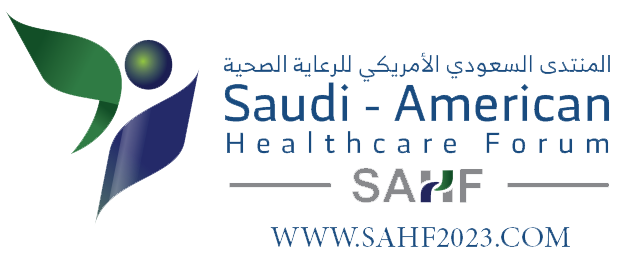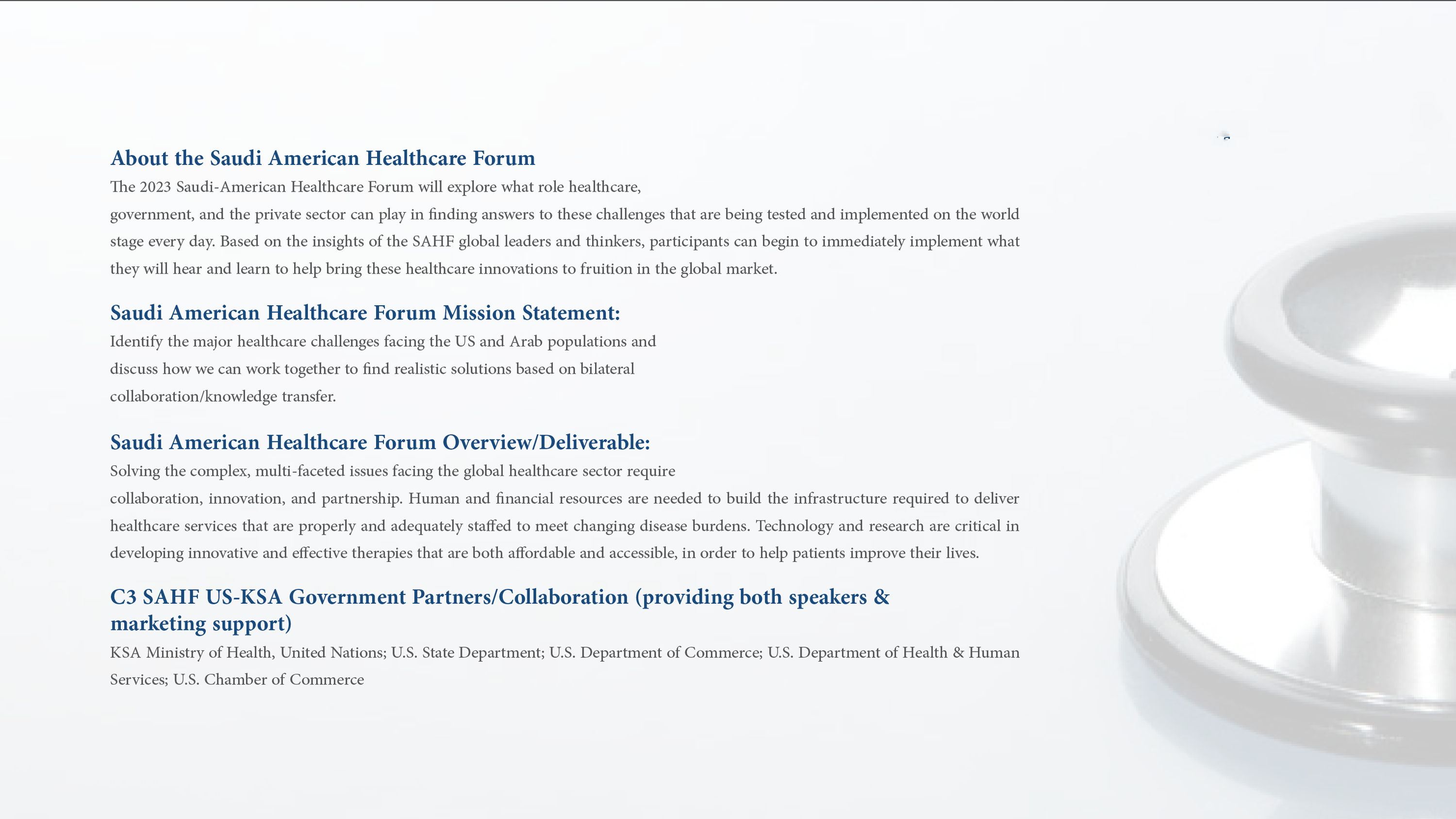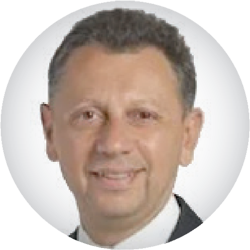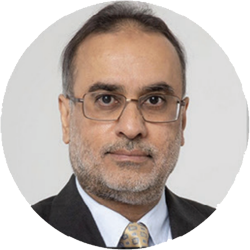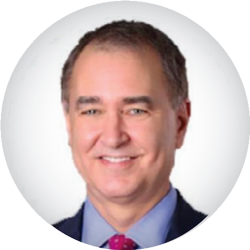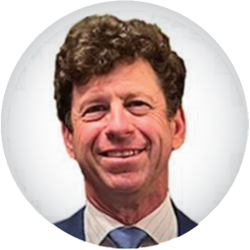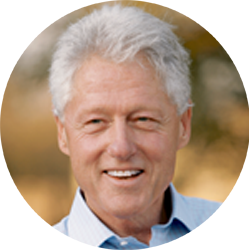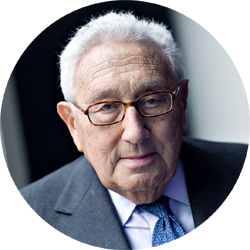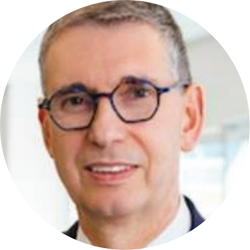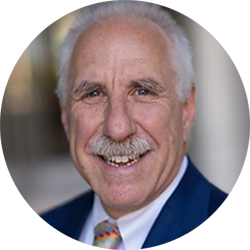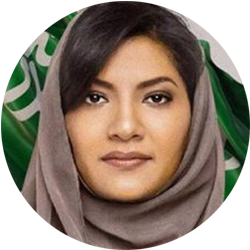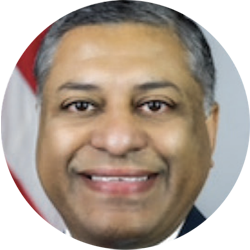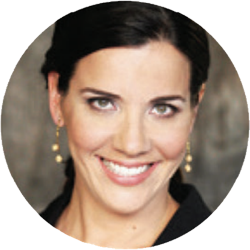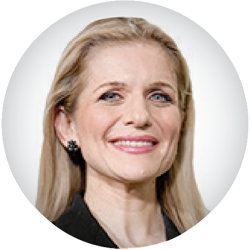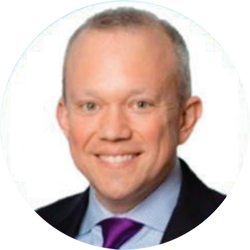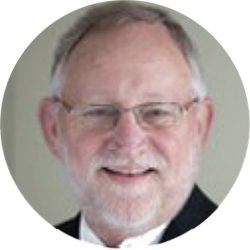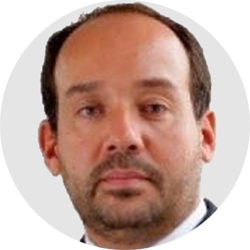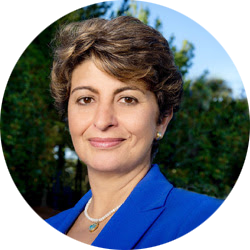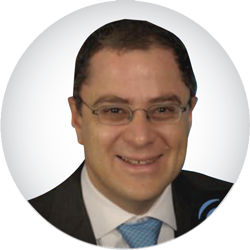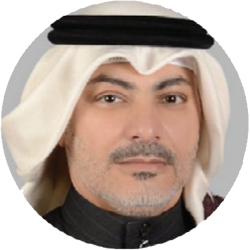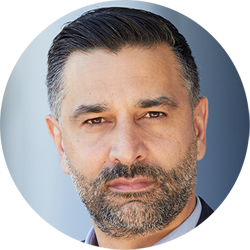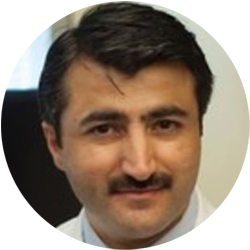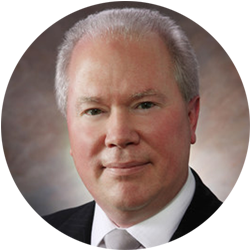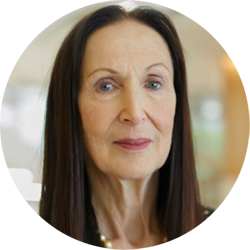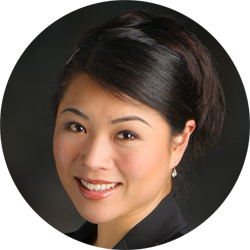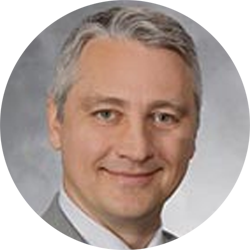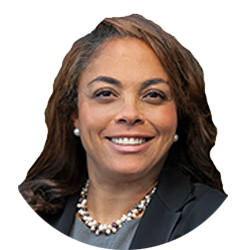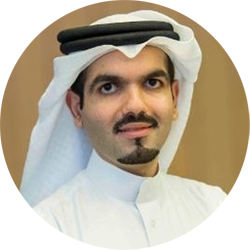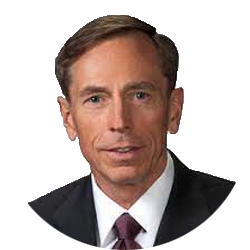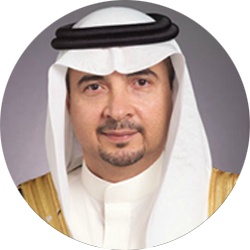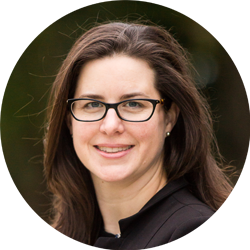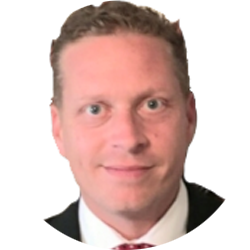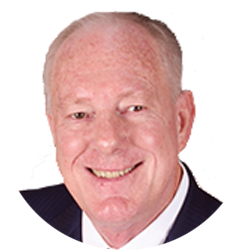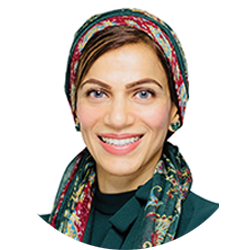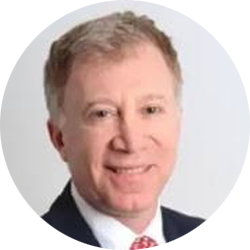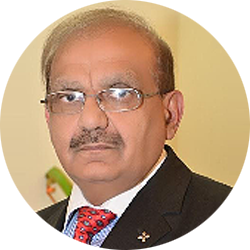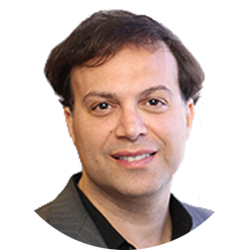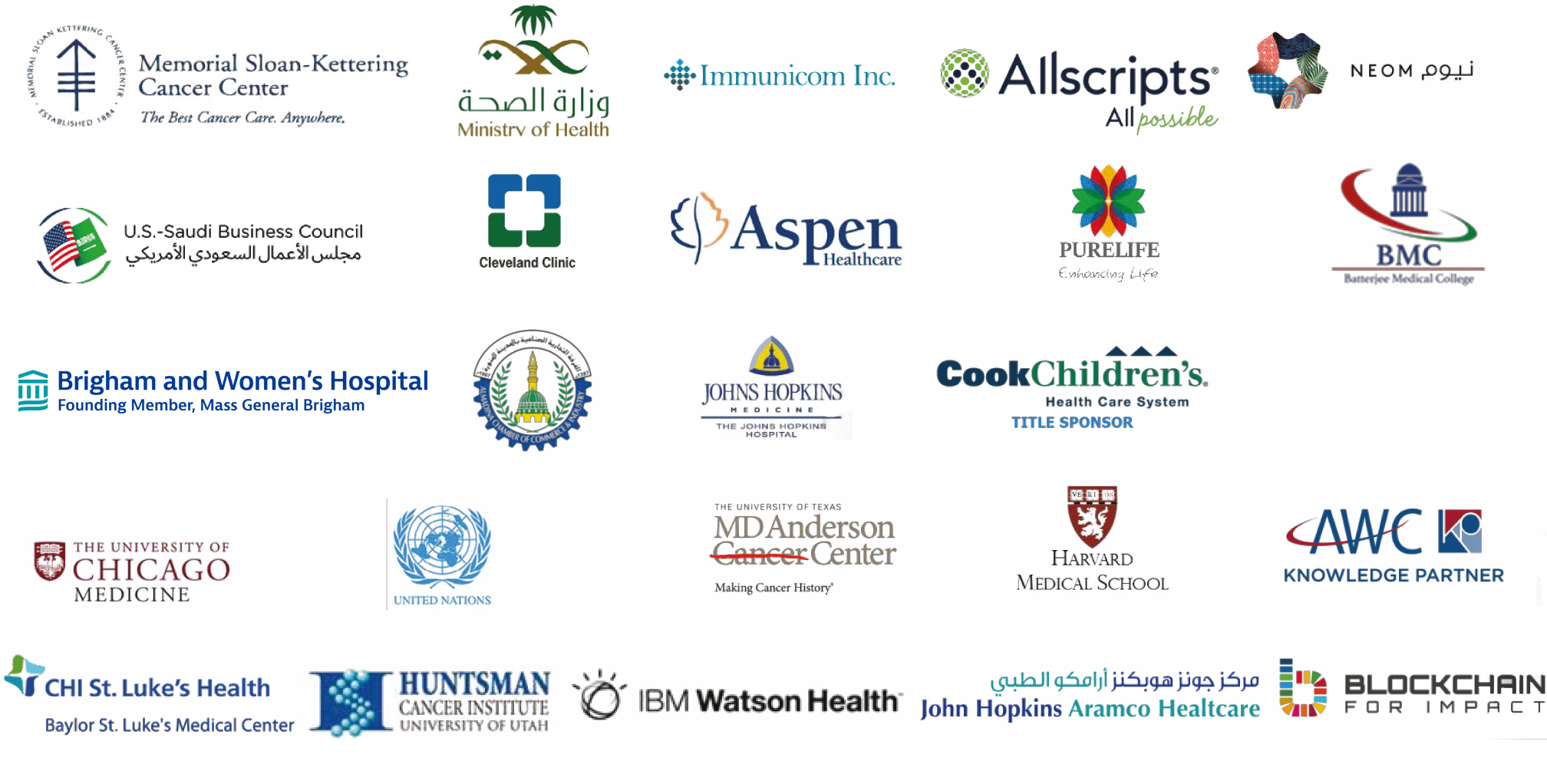Dr. George Cheriyan, MD, FRCP (Lon), FRCPI, MBA is the Corporate CEO and Chief Medical Officer of the
King Hammad American Mission Hospital (KHAMH) in Bahrain, the oldest hospital in the GCC. He worked as a
Neonatologist for over 25
years after obtaining his post graduate training in Pediatrics in London at The Hospital for Sick Children,
Great Ormond Street, and sub-specialization in Neonatology at the Hospital for Sick Children, in Toronto,
Canada.
Dr. Cheriyan has also worked as a Consultant Neonatologist in the National Health Service In London before
moving up to take up a position as Head of Neonatology at the Saudi Aramco Hospital where he worked for 18
years
in various capacities of leadership. He is a trained 'Improvement Advisor' in Healthcare quality from the
Institute of Healthcare Improvement (IHI) in Boston, MA where he was adjunct teaching member of the faculty
and
has been an invited speaker at various healthcare Forums both in and outside of the US.
He further obtained training in Healthcare management at the Harvard Business School and is both an alumni
of
the Harvard Business School and the Harvard Kennedy School of Government. His area of interest is the
economics
in developing a model of non-profit healthcare which is both affordable and of high quality.
Gianrico Farrugia, M.D., president and chief executive officer of Mayo Clinic, leads the No. 1 ranked
hospital by U.S. News and World Report and Newsweek. Powered by a 76,000-person workforce, Mayo Clinic cares
for more
than 1.4 million people each year with serious or complex illnesses from all 50 U.S. states and 140
countries. With a singular focus on the need for patient-centered health care transformation, Dr. Farrugia
is a leading
voice in the movement of health care from a linear pipeline operational model to a platform-based model.
Prior to his appointment as CEO, Dr. Farrugia served as CEO of Mayo Clinic in Florida. Under his leadership,
Florida established itself as a destination medical center for the Southeast. He also led the Mayo Clinic
Center
for Individualized Medicine, which brings genomics into routine clinical care, and co-founded the Mayo
Clinic
Center for Innovation. He is a member of the Mayo Clinic Board of Trustees and Governors.
Dr. Farrugia has been a Mayo Clinic physician for more than 30 years. He is jointly appointed in the
Division of
Gastroenterology and Hepatology, Department of Internal Medicine, and the Department of Physiology and
Biomedical Engineering. He also is a professor of medicine and physiology at the Mayo Clinic College of
Medicine
and Science. He completed his undergraduate training at St. Aloysius College and earned his medical degree
from
the University of Malta Medical School.
Dr. Farrugia is the co-author of "Think Big, Start Small, Move
Fast: A Blueprint for Transformation from the Mayo Clinic Center
for Innovation", a book highlighting the need for change in the
delivery of health care. He is a past president of the American Neurogastroenterology and Motility Society.
An
active translational scientist and NIH researcher, he has published more than 350 academic articles. He also
is
co-chair of the Global Health and Healthcare Governors, World Economic Forum.
Prof. Eyal Zimlichman is an internal medicine physician, a health care executive and a researcher focused on
assessing and improving health care quality and value, patient engagement and patient safety.
Prof. Zimlichman currently serves as Chief Transformation Officer and Chief Innovation Officer at Sheba
Medical
Center, Israel's largest hospital. In this position he oversees the transformation efforts carried out at
the
Medical Center as it aims to redesign healthcare to be focused on patients, while being more effective,
efficient and equitable. For these reasons, Prof. Zimlichman founded Sheba's global innovation program (ARC
-
Accelerate, Redesign and Collaborate). Prior to this Prof. Zimlichman held the position of Chief Medical
Officer
and before that as Chief Quality Officer, both at Sheba.
Preceding his work at Sheba, Prof. Zimlichman held the position of Lead Researcher at Partners Health Care
Clinical Affairs Department in Boston where he was involved in the efforts to bring about a strategic care
redesign initiative. In that capacity, Prof. Zimlichman established their program for collecting and
reporting
patient reported outcomes across the continuum of care, a program that earned international appraisal.
During
that time, Prof. Zimlichman held an appointment at Brigham and Women's Hospital and Harvard Medical School
affiliated Center for Patient Safety Research and Practice, where he conducted research on implementing
technology to improve quality and patient safety.
Prof. Zimlichman is a founding member of the International Academy of Quality and Safety in Health Care and
an
International Expert at the International Society of Quality in Healthcare (ISQua). He also served as an
advisor
to the Office of the National Coordinator for Health Information Technology in the U.S. Department of Health
and
Human Services.
In 2007 Prof. Zimlichman was selected as a member of Sheba's Talpiot Medical Leadership Program, a program
aimed
at advancing the brightest young physicians into leadership roles. In 2017 he was appointed head of the
program.
Prof. Zimlichman is a graduate of the Harvard School of Public Health Master of Science in Healthcare
Management
program and has earned his MD at the Technion Israel Institute of Technology.
Dr. Maan Fares, MD, is a practicing cardiologist in the Robert and Suzanne Tomsich Department of
Cardiovascular
Medicine, and Chairman of Global Patient Services, at the Cleveland Clinic.
The Cleveland Clinic is a nonprofit multispecialty academic medical center that integrates clinical and
hospital
care with research and education. Located in Cleveland, Ohio, it was founded in 1921 by four renowned
physicians
with a vision of providing outstanding patient care based upon the principles of cooperation, compassion and
innovation. The Cleveland Clinic has pioneered many medical breakthroughs, including coronary artery bypass
surgery
and the first face transplant in the United States. U.S.News & World Report consistently names the Cleveland
Clinic
as one of the nation's best hospitals in its annual "America's Best Hospitals" survey.
As a global health care organization with an international reputation for excellence in specialty care
particularly in cardiovascular diseases. The department of Global Patients Services helps in organizing the
care
and management of more than 5,000 patients annually. Patients arrive from all corners of the globe with
immensely diverse backgrounds seeking various health care needs. Their care demands excellence in management
of
complex medical illnesses and special cultural awareness to ensure a better experience and superb outcomes.
Dr. Fares is board-certified in cardiovascular disease, nuclear cardiology/cardiovascular imaging (Level II,
including SPECT and PET) and echocardiographic imaging (Level II) and has completed Level II training in
cardiac
CT angiography. He performs nearly 2,000 nuclear stress tests, 2,000 adult echocardiograms, and more than
2,500
stress tests and EKGs each year.
Dr. Fares earned his medical degree from the University of Damascus, School of Medicine, Syria. He completed
a
residency at the Cleveland Clinic, in Cleveland, Ohio, and a fellowship in cardiovascular medicine at New
England
Medical Center, in Boston, Massachusetts. Dr. Fares spent time on staff at the Massachusetts General
Hospital,
Boston, as a clinical associate in echocardiography. Prior to his appointment to the Cleveland Clinic
medical
staff in 2013, Dr. Fares was a member of the Ohio Permanent Medical Group/Kaiser Permanente medical staff
and
Chief of Cardiology. Additional positions he held with Kaiser Permanente Ohio include Associate Medical
Director
for Medical Specialties and member of the Board of Directors.
He is a member of the American College of Cardiology, American Society of Echocardiography and the American
Society of Nuclear Cardiology and is a founding member of the Syrian American Medical Society.
Deborah L. Birx, MD is a world-renowned medical physician and expert on HIV/AIDS and infectious diseases and
a
diplomat who served as a special representative for global health diplomacy. Most recently, Dr. Birx served
on
the White House Coronavirus Task Force from Feb. 2020 to Jan. 2021. Her three-decade-long career has focused
on
HIV/AIDS immunology, vaccine research, and global health. As the U.S. Global AIDS Coordinator for presidents
Barack Obama and Donald Trump, Dr. Birx oversaw the implementation of the U.S. President's Emergency Plan
for
AIDS Relief (PEPFAR), the largest commitment by any nation to combat a single disease in history, as well as
all
U.S. government engagement with the Global Fund to Fight AIDS, Tuberculosis, and Malaria. Serving as the
U.S.
Special Representative for Global Health Diplomacy, she aligned the U.S. Government's diplomacy with foreign
assistance programs that address global health challenges and accelerate progress toward achieving an
AIDS-free
generation; ending preventable child and maternal deaths; and preventing, detecting, and responding to
infectious disease threats.
In 1985, Dr. Birx began her career with the Department of Defense (DoD) as a military-trained clinician in
immunology, focusing on HIV/AIDS vaccine research. From 1985-1989 she served as an Assistant Chief of the
Hospital Immunology Service at Walter Reed Army Medical Center. Through her professionalism and leadership
in
the field, she served as the Director of the U.S. Military HIV Research Program (USMHRP) at the Walter Reed
Army
Institute of Research from 1996-2005. Dr. Birx helped lead one of the most influential HIV vaccine trials in
history (known as RV 144, or the Thai trial), which provided the first supporting evidence of any vaccine's
potential effectiveness in preventing HIV infection. During this time, she also rose to the rank of Colonel,
bringing together the Navy, Army, and Air Force in a new model of cooperation - increasing the efficiency
and
effectiveness of the U.S. military's HIV/AIDS efforts through inter-and intra-agency collaboration. Then
known
as Colonel Dr. Birx, she was awarded two prestigious U.S. Meritorious Service Medals and the Legion of Merit
Award for her groundbreaking research, leadership and management skills during her tenure at DoD.
From 2005-2014, Dr. Birx served as the Director of the Centers for Disease Control and Prevention's (CDC)
Division of Global HIV/AIDS (DGHA) in the CDC Center for Global Health. As DGHA Director, she utilized her
leadership ability, superior technical skills, and passion to achieve tremendous health impact. She
successfully
led the implementation of CDC's PEPFAR programs around the world and managed an annual budget of more than
$1.5
billion. Dr. Birx was responsible for all of the agency's global HIV/AIDS activities, including providing
oversight to more than 400 staff at headquarters, over 1,500 staff in the field, and more than 45 country
and
regional offices in Africa, Asia, the Caribbean, and Latin America. Recognized for her distinguished and
dedicated commitment to building local capacity and strengthening quality laboratory health services and
systems
in Africa, in 2011, Dr. Birx received a Lifetime Achievement Award from the African Society for Laboratory
Medicine. In 2014, CDC honored her leadership in advancing the agency's HIV/AIDS response with the highly
prestigious William C. Watson, Jr. Medal of Excellence, the highest honor bestowed by the CDC.
Dr. Birx received her medical degree from the Hershey School of Medicine, Pennsylvania State University. She
trained in internal medicine and basic and clinical immunology at the Walter Reed Army Medical Center and
the
National Institutes of Health. Dr. Birx is board certified in internal medicine, allergy and immunology, and
diagnostic and clinical laboratory immunology. She has published over 220 manuscripts in peer-reviewed
journals,
authored nearly a dozen chapters in scientific publications, as well as developed and patented vaccines.
Dr. Ghassan Abou-Alfa, MD, MBA joined the Gastrointestinal Oncology Service at Memorial Sloan Kettering
Cancer
Center in New York back in 2001. Dr. Abou-Alfa specializes in the treatment of gastrointestinal cancers and
in
particular, liver cancer. Dr. Abou-Alfa received his medical degree from the American University of Beirut,
Lebanon, and completed his post-doctoral training at Yale University School of Medicine. He received his MBA
from Columbia University.
Dr. Abou-Alfa serves as the chair of the National Cancer Institute (NCI) Task Force for Hepatobiliary
Cancers,
the chair of the AIDS Malignancy Consortium (AMC) Non-AIDS Defining Malignancies (NADC) Liver/GI Task Force,
and
is the President-Elect for the International Society of Gastrointestinal Oncology. Dr. Abou-Alfa has
lectured
worldwide on the subject on gastrointestinal malignancies. He serves as the chair the medical/scientific
board
of the Cholangiocarcinoma Foundation and the Blue Faery Liver Foundation, and also serves on the National
Medical Advisory Committee of the American Liver Foundation.
Dr. Abou-Alfa has also spearheaded many international projects since 2006, and now serves on the
institutional
leadership panel for international healthcare. Dr. Abou-Alfa helped Memorial Sloan Kettering Cancer Center
establish a strong relationship with many institutions worldwide, with an ongoing faculty exchange, repeated
video-link conferencing, and class-training courses with China and the Middle East. These joint
collaborations
have led to the development of the first joint tissue bank with a shared database with Memorial
Sloan-Kettering
Cancer Center and supported fellowship opportunities for excelling medical graduates. Dr. Abou-Alfa has also
helped promote and enhance the MSKCC international patients' referral base.
Dr. Mark A. Davis is an international healthcare expert and physician leader with extensive experience and
success in driving business and healthcare network growth, operations, technological innovation, and
transnational ventures. Dr. Davis is currently chief operating officer at Miami Cancer Institute, part of
Baptist Health South Florida. At Miami Cancer Institute, he is responsible for operational excellence and
patient-centered care, playing a key role in developing long-term strategy in the areas of clinical care and
developing and acquiring the latest technologies.
Prior to joining Miami Cancer Institute, Dr. Davis came from Brigham and Women's Hospital in Boston,
Massachusetts, where he was vice president of Brigham Health International, leading academic collaborations
between Brigham and multiple international parties, and executive director of Business Development and
Strategic
Initiatives, working on health system and hospital design, education, research and operations both
nationally
and internationally. He served most recently as senior advisor of Strategic Initiatives and Partnership and
as
an associate professor of emergency medicine at Harvard Medical School.
Dr. Davis has more than 20 years of experience as a national and global health leader and emergency medicine
physician. In collaboration with the Dana-Farber Cancer Institute, he helped establish a
multi-billion-dollar
advanced cancer hospital in China. He has served as a visiting scientist at NASA Johnson Space Center, an
international ambassador to Romania and Israel through the American College of Emergency Physicians, and a
member of the World Health Organization's Essential Trauma Care Program Steering Committee. He has also
advanced
telehealth platforms internationally and among Native American underserved populations.
Dr. Davis received his medical degree from the University of Pennsylvania School of Medicine, where he was
recognized with the Medical Scholar award in 1990. He also has a master's degree from the University of
Pennsylvania Graduate School of Education. He completed an internship and residency in emergency medicine at
the
University of California, Los Angeles Medical Center. His numerous honors include the Humanitarian Award
from
the Hippocrates Society, Brigham and Women's Hospital; the Best Faculty Clinician Award, Harvard Affiliated
Emergency Medicine Residency Program, Brigham and Women's Hospital; and an International Emergency Medicine
Fellowship Award from the Ronald Reagan Institute of International Emergency Medicine, George Washington
University School of Medicine.
Dr. Davis serves on the editorial boards of many professional journals and has served as reviewer for such
publications as the Physician Leadership Journal, Annals of Emergency Medicine, American Journal of
Emergency
Medicine, European Journal of Emergency Medicine and Biomed Central.
Dr. Gabi Hanna, MD is an Associate Director at the Duke Cancer Institute, surgical and imaging facility
which
leads translation medicine and drug development to clinical work, foster innovations design and conduct
preclinical researches translational to clinic and patient care. Collaborate and work with Biotech and
pharmaceutical industry to conduct preclinical and translation research at Duke, including: Clinical trial;
GLP
good laboratory practice; IND new drugs development; IDE and medical device development; novel imaging
methods.
Dr. Hanna worked with GlaxoSmithKline pharmaceutical on antiangiogenic therapy project. He led the
multidisciplinary team at Duke to develop new treatment protocol based the tumor oxygenation after
evaluation
the different antiangiogenic therapies on cancer prognosis; microenvironment; vascular; drug delivery; EMT;
VGF;
PDGF.
Dr. Hanna is also the President, Chairman of North Carolina Society of Physician Entrepreneurs. As serial
entrepreneurs, Dr. Hanna took the role to be the president and chairman for the professional society
dedicated
to advancing healthcare innovation. By linking clinicians, entrepreneurs, technologists, investors, VC/ PE,
universities, industries and policymakers with creative business strategy to create next generation of
technology to get to the new area of medical practice.
Dr. Hanna newest technology start-up is AMERICAN REMOTE HEALTH and TeleCancer. It is the first and only
Telemedicine service and app that focuses on cancer and chronic diseases to improves the outcome care. By
utilizing telecommunication technology, it helps extend the medical advanced knowledge and research of
academia
centers and top universities like Duke, Mayo Clinic, the Cleveland Clinic, NIH, Harvard, etc. beyond the
wall of
universities.Patients have the option to upload their complete medical records (via HIPPA compliant apps or
EMR
web system) and communicate to the top 2% of doctors in US. American Remote Health doctors will provide a
written treatment plan including genetic personalized treatment and clinical trials; collaborate on the
treatment with the local doctors; or arrange the treatment and logistic for patients to come to the best
hospital to receive the treatment/ surgery upon the next day of their arrival. American Remote Health is not
just saving lives and improving outcome but eliminating unnecessary surgeries, and possibly "wrong"
treatments.
Dr. Hanna graduated medical school from Aleppo, surgical internship acting at University of Texas Medical
Branch
and his Radiation Oncology postdoctoral fellowship at Duke University.
BioSAFE technology provides environmentally responsible solutions for the treatment and disposal of biologic
and
medical waste. The company also serves specialized high containment government and private laboratories,
vaccine
production facilities, and leading agricultural research centers, to eliminate the threat of hazardous or
infectious agents.
Prior to leading BioSAFE Engineering, Mr. Mervis was COO of Mervis Industries, one of the largest private
recyclers in the USA, recycling over 1 billion pounds per year of metals, plastics, paper, and electronics.
Mr.
Mervis has leveraged this experience to make BioSAFE a leader in solutions that enable recycling medical and
laboratory plastics.
Dr. Khalid Khabar is Chairman,Department of Molecular Biomedicine, and a Principal Senior at King Faisal Hospital & Research, KSA. His focus is Biomedical Research which covers the spectrum from Basic Science to Translational Research to Innovation. An internationally-known expert, he focuses on the field of mRNA stability in health & disease
Mr. John (Johnny) P. Walker II is a graduate of Pace University and the United States Marine Corp where he started his experience in logistics serving in the MT Platoon, Service Company, 6th Comm BN, 4th DV USMC as a 3521 (Diesel Mechanic: 2E). Honorably Discharged at the rank of E-3 in 2002. From there he gained extensive experience in Stevedoring operations from Break Bulk; Liquid transfer; Supervising Union Labor; Trucking; Equipment Control; and Container Marine Operations, in one of the busiest Ports in the western hemisphere. Other areas of Logistical experience include Route Logistics; Warehouse Shipping and Receiving; and, exporting new products globally for product introduction to various Global markets.
Mr. Walker has been featured in two documentaries: The “Science Channel’s” – “Mega Machines – Sea Giants: Season 1: Episode 8 ‘New York Mega Port’” and this year’s winner for “Best Featured Documentary – New York Movie Awards” – “Healing the Heroes of 9-11: The Way Forward”. other appearances include National Television: NewsMax “America Right Now” (two appearances to date). He also has three published articles in various global media outlets.
Ambassador James B. Smith served as U.S. Ambassador to Saudi Arabia from 2009-2013.
Prior to his appointment, Ambassador Smith had served in a variety of executive positions with Raytheon Company involving corporate strategic planning, aircraft manufacturing, and international business development.
Smith had a 28-year career in the United States Air Force and served around the world in a variety of operational assignments, including combat missions during Operation Desert Storm.
He held a variety of staff assignments involving coalition partners, and served as Air Force chair and professor of military strategy at the National War College. During his final assignment at U.S. Joint Forces Command he led Millennium Challenge, the largest military transformation experiment in history. He was promoted to Brigadier General in 1998 and retired from the Air Force in 2002.
Mr. John Payne is Chairman & CEO of PURELIFE Health Sciences Group and heads a team of scientific
researchers focusing on genetics and its relation to diabetes. The Arizona and Florida based research group has
spent 23 years researching and identifying causes and solutions to metabolic syndrome health issues based on
genetics, DNA based nutritional adaptation, and the interactions between genes that are critical to live long
& healthy lives. Significant research has been done in Africa and Australia to identify genetically
compatible ingestible sources to support broad spectrum human health, taking into consideration xenohormesis,
and how it can affect mitochondrial and telomere health, geography, ethnicity and culture. PURELIFE Health
Sciences has bio-engineered scientific formulas and clinical protocols that meet the WHO criteria for being
genetically compatible, while reducing inflammation and boosting the immune system resulting in prevention of,
and long-term reversal of diabetes. They bridge mankind's ancient, genetically determined DNA with the
biological human needs of today. What we eat and drink must match our inherited DNA to be effective in
supporting our overall health and wellness. PURELIFE Health Sciences provides the innovative matched resources
for health and healthy weight management.
PROFILE
Researcher • Author • Formulator Product / Ingredient Platform Development More than 35 years of experience in
developing ingredient platforms for medical and nutraceutical products domestically and internationally. Devoted
to developing natural health products that are genetic based and genetically compatible. Concentrating on
ingredient profiles that are based on traditional food resources that address the large and growing need for
genetic based nutrition.
HISTORY
- Research/Development/Technology
- Nutraceuticals for the prevention and long term reversal of type 2 Diabetes.
- Platform for fruit & vegetable extracts for health and Diabetes.
- Plant based high viscosity polysaccharides for menopause symptoms.
- Nutraceuticals for immune system enhancement.
- Pure Minerals for bone, teeth, osteoporosis and dental health.
- Plant based weight loss formulas and body composition improvements that work thru the digestive system.
- Anti-inflammatory formulas to dampen systemic inflammation.
Dr Hajjeh is a senior public health leader with 30 years experience in global health, infectious diseases epidemiology, health policy and diplomacy, and health management, especially in the Eastern Mediterranean Region.
Dr Hajjeh is currently holding the position of the Director of Programme Management (DPM) at the WHO Eastern Mediterranean Regional Office since April 2019. Between 2016 and 2019, she held the position of the Director of the Department of Communicable Diseases Prevention and Control.
Prior to joining the WHO Regional Office in 2016, Dr Hajjeh worked at the US Centers for Disease Control and Prevention (CDC) for 23 years, where she held many senior positions. Her last position was the director of Bacterial Diseases division (2008-16). Between 2005 and 2010, Dr Hajjeh was the Director of the GAVI Hib Initiative, that introduced Hib vaccines to millions of children in limited resource countries around the world. During her work at CDC, Dr Hajjeh led responses to major epidemics across the world, including meningitis in Africa, and during hajj in Saudi Arabia in 2000, cholera in Haiti in 2010, as well as Middle East respiratory syndrome (MERS) in Saudi Arabia and Ebola in West Africa.
Dr Hajjeh holds a Medical Doctor (M.D.) degree from the American University of Beirut (AUB), Lebanon, and is American board certified in Internal Medicine and Infectious Diseases, as well as trained in epidemiology at the CDC (EIS Class of 1993). She has received many awards, including the prestigious U.S. Federal Employee of the Year Award in 2014 for her global vaccine work. Dr Hajjeh has published over 200 peer-reviewed papers and book chapters, serves as a reviewer for multiple journals, and holds visiting professor positions in medicine and public health at Emory University, Johns Hopkins University and AUB (Lebanon).
Dr Mahmoud Alyamany, with more than 20 years in neurosurgery and healthcare administration, was previously King Fahad Medical City CEO. He also sits on the Saudi Ministry of Health board and has worked on governmental health transformation programs. He is an adjunct professor at McGill University. He is a highly accomplished Neurosurgeon & Health Administrator, as noted below:
American & Canadian Board Qualified Neurosurgeon
Sub-specialized in Cerebrovascular & Skull-Base Surgery
Masters of Health Care Administration from Washington University in St.Louis. USA
Harvard Business School Finance for Executives Certificate
Harvard Business School Strategic Planning for Healthcare Providers Certificate
Published in Peer Reviewed Specialized International Journals
Published in Multiple Standard Textbooks of Neurosurgery
Participated in Multiple Clinical Researches as Principle Investigator & Co-Investigator
Established a world class National Neuroscience Institute (NNI) in KSA
Defined The Practice of Neurosurgery in KSA
Introduced the Technology of Intra-operative Imaging to KSA
Introduced the Technology of Magneto-Encephalography (MEG) to KSA
Introduced the Concept of Neuroscience as Related-Multidisciplinary-Services into the Health Care System at MOH of KSA
Standardized the Practice of Common Diseases involving the Nervous System
Participated in Establishing the concept of Disease Registries in Neuroscience in KSA
Participated in Advancing Research in the Field of Neuroscience
Sat the standards of credentialing healthcare providers in the Medical Cities in Saudi Arabia
Introduced the concept of Patient Experience in healthcare in Saudi Arabia by establishing the first Executive Administration of Patient Experience in Saudi Arabia
Introduced Predictive Analytics & Cognitive Computing into healthcare to the Medical Cities in Saudi Arabia
Established the Business Intelligence Office (BIO) into healthcare to use data & analytics to direct business
Established means for measuring the productivity of healthcare providers
Established the first Change Management Institute in the Medical Cities in Saudi Arabia
Established the Cost Accounting System in the Medical Cities
Introduced the DRG methodology to the Saudi Ministry of Health
Expanded the scope of services of KFMC
Dr. Rothman began his research career as an undergraduate at the Massachusetts Institute of Technology, where
he
studied E. coli DNA repair under Graham C. Walker. He completed his B.S. in biology in 1980 and was elected
to Phi Beta Kappa. He then
entered medical school at Yale University. While at Yale, Dr. Rothman studied T cell subsets in the
lab of Leonard Chess at Columbia University. He received his medical degree in 1984, earning a place in the
Alpha Omega Alpha
Medical Honor Society.
Dr. Rothman went on to a medical residency and rheumatology fellowship at Columbia-Presbyterian Medical
Center in New York City
before joining the medical faculty of the Columbia University College of Physicians
and Surgeons in 1986.There, he also completed a postdoctoral biochemistry fellowship with Frederick
W. Alt, a Howard Hughes Medical Institute investigator, studying immunoglobulin class-switch recombination.
At Columbia, Dr. Rothman was appointed the Richard J. Stock Professor of Medicine (Immunology) and
Microbiology and chief of the pulmonary, allergy and critical care division.
A molecular immunologist, Dr. Rothman's research focused on immune system molecules called cytokines. He
investigated the role these molecules play in the normal development of blood cells, in addition to the
abnormal blood-cell development that leads to leukemia. He also studied the function of cytokines in immune
system responses to allergies and asthma. The National Institutes of Health consistently funded his work.
In 2004, Dr. Rothman accepted a position as head of internal medicine at the Carver College of Medicine at
the University of Iowa. In 2008, he was named dean of the Carver College of Medicine and leader of its
clinical practice plan, a role in which he served for four years. In 2012, he became the 14th dean of the
Johns Hopkins School of Medicine and the second CEO of
Johns Hopkins Medicine.
Dr. Rothman is on the Board of Directors of Merck and Company, as well as the King Faisal Specialist Hospital
& Research Centre in Saudi Arabia.Dr. Rothman began his research career as an undergraduate at
the Massachusetts Institute of Technology, where he
studied E. coli DNA repair under Graham C. Walker. He completed his B.S. in biology in 1980 and was
elected to Phi
Beta Kappa. He then entered medical school at Yale University.
While at Yale, Dr. Rothman studied T cell subsets in the lab of Leonard Chess at Columbia University. He
received his medical degree in 1984, earning a place in the Alpha Omega
Alpha Medical Honor Society.
Dr. Rothman went on to a medical residency and rheumatology fellowship at Columbia-Presbyterian Medical
Center in New York City
before joining the medical faculty of the Columbia University College of Physicians
and Surgeons in 1986.There, he also completed a postdoctoral biochemistry fellowship with Frederick
W. Alt, a Howard Hughes Medical Institute investigator, studying immunoglobulin class-switch recombination.
At Columbia, Dr. Rothman was appointed the Richard J. Stock Professor of Medicine (Immunology) and
Microbiology and chief of the pulmonary, allergy and critical care division.
A molecular immunologist, Dr. Rothman's research focused on immune system molecules called cytokines. He
investigated the role these molecules play in the normal development of blood cells, in addition to the
abnormal blood-cell development that leads to leukemia. He also studied the function of cytokines in immune
system responses to allergies and asthma. The National Institutes of Health consistently funded his work.
In 2004, Dr. Rothman accepted a position as head of internal medicine at the Carver College of Medicine at
the University of Iowa. In 2008, he was named dean of the Carver College of Medicine and leader of its
clinical practice plan, a role in which he served for four years. In 2012, he became the 14th dean of
the Johns Hopkins School of Medicine and the second CEO of
Johns Hopkins Medicine.
Dr. Rothman is on the Board of Directors of Merck and Company, as well as the King Faisal Specialist Hospital
& Research Centre in Saudi Arabia.
In January 2021, Israel opened an embassy in Abu Dhabi in the United Arab Emirates (UAE), with Ambassador
Na'eh serving as head of the mission. In November of 202 he began working at the Israeli embassy in Manama,
vacating his temporary posting in Abu Dhabi, where he spent nine months serving as the first diplomat to
represent Israel in the United Arab Emirates. Israel signed normalization agreements with the UAE and
Bahrain in September 2020, with Morocco and Sudan joining what is now known as the Abraham Accords a few
months later.
Dr. Toby Cosgrove M.D., is the former President and Chief Executive Officer of the Cleveland Clinic and
currently
serves as an Executive Advisor for the Cleveland Clinic global health system.
Dr. Cosgrove is a sought-after speaker worldwide. He has addressed the World Economic Forum Annual Meeting
at Davos, Switzerland, and the Senate Health, Education, Labor and Pensions Committee, in Washington, D.C.
He
is regularly quoted and featured in national magazines and newspapers, including a cover story in Time, and
major articles in Newsweek, the New York Times, and the Washington Post. He has appeared on CNN, Fox, MSNBC,
NBC,
CBS, "The Charlie Rose Show" on PBS, and other national media outlets.
The recipient of the Cleveland Clinic's Master Clinician Award, Innovator of the Year Award and Lerner
Humanitarian
Award, Dr. Cosgrove is also a member of the Cleveland Medical Hall of Fame and Cleveland Business Hall of
Fame.
In
2007 he was named Cleveland Business Executive of the Year by the Sales and Marketing Executives of
Cleveland,
and Castle Connolly's National Physician of the Year. He also received the Woodrow Wilson Center Award for
Public Service as well as Harvard Business School's Award from HBS Alumni, Cleveland, and the Humanitarian
Award
of the Diversity Center of Northeast Ohio. Dr. Cosgrove topped Inside Business's "Power 100" listing for
Northeast Ohio, and is highly ranked among Modern Healthcare's "100 most powerful people in healthcare" and
"most powerful physician executives".
Prof. Kreiss is highlighted for his revolutionary initiatives in his esteemed role as Director General of
Sheba
Medical Center, the largest hospital in the Middle East. In 2018, Professor Kreiss was ranked as the 5th
most
influential person in the country, by The Marker, the leading business publication in Israel
Since he became Director General of Sheba, Prof. Kreiss has demonstrated powerful leadership skills and many
pioneering accomplishments. He expanded Sheba's research programs significantly and introduced many
breakthrough
innovations to improve global healthcare. Prof. Kreiss advanced Sheba as an epicenter for ultra-progressive
medical studies and care, thereby helping to save lives in health facilities around the world.
In particular, TheMarker cites the modern and promising City of Health Project, which is renovating and
upgrading Sheba's campus with cutting-edge technologies and facilities. This project is regarded as having a
tremendous potential impact on Israel and on medicine worldwide. "We not only want to influence patient care
and
the future of medicine in Israel, but also on a global scale," says Prof. Kreiss.
Prof. Kreiss is also credited with helping to garner international respect for Sheba Medical Center's global
humanitarian efforts, as well as for the way the hospital is an oasis of peace in the region. Sheba's campus
in
Tel HaShomer includes an acute care hospital and a rehabilitation hospital, and it welcomes patients from
all
over the world indiscriminately.
Professor Kreiss also served in the Israel Defense Forces in various capacities for 25 years, achieving the
rank
of Brigadier General. In 2011, he was appointed Surgeon General of the IDF.
Dr. Stephen Hahn studies the molecular machines that make mRNA. At any given time, only certain genes are
copied
into mRNA because only those proteins are needed for specific cellular functions. Our genes act as a recipe
book
for our cells. They contain the instructions for making all the proteins that cells need — but there are
only
two copies of each gene, and our cells need hundreds if not thousands of copies of a protein to function
properly. To address this, cells make many copies of a gene, which can be used by the protein-building
factories
as protein-making instructions. These copies are called messenger RNA, or mRNA.
Dr. Hahn seeks to understand how the mRNA-producing machines work, and how cells turn them on and off at the
right time. Alterations in this process occur in many human diseases, making it critical for researchers to
better understand this fundamental process.
Ms. Seema Verma served as administrator of the Centers for Medicare and Medicaid Services, the agency that
oversees Medicare, Medicaid, and the insurance markets, from 2016 - 2020 during the Trump Administration.
She
was named as "Modern Healthcare's" 2019 number one most influential person in health care. Her health care
articles have been published in the Wall Street Journal, Washington Post, Health Affairs, Modern Healthcare,
Newsweek, CNN, and USA Today.
Ms. Verma was vice president of the Health & Hospital Corporation of Marion County and worked at the
Association
of State and Territorial Health Officials in Washington, D.C. She founded health policy consulting firm SVC,
Inc., in June 2001. She was president and CEO of the company, which worked with state insurance agencies and
public health agencies in preparation for the implementation of the Affordable Care Act. She assisted
Indiana
and Kentucky, as well as other states, in the design of Medicaid expansion programs under the ACA. In her
work
with Indiana, Ohio, and Kentucky, she developed Medicaid reform programs under the Section 1115 waiver
process.
Ms. Verma received a bachelor's degree in life sciences from the University of Maryland, College Park, in
1993.
She earned a Master of Public Health, with a concentration in health policy and management, from the Johns
Hopkins School of Public Health in 1996.
Dr. Jeffrey Graves joined 3D Systems in May 2020. Prior to joining the company, from 2012 to May 2020, he
served
as CEO, President and Director of MTS Systems Corporation, a global supplier of test, simulation, and
measurement systems. From 2005 until 2012, Dr. Graves served as President and CEO of C&D Technologies, Inc.
He also held leadership roles with Kemet Corporation as Chief Operating Officer (2001-2003) and CEO (2003 to
2005). Previously he held a number of leadership and technical roles with GE, Rockwell Automation and Howmet
Corporation. He currently serves on the Board of Directors of Hexcel Corporation.
Dr. Graves holds a bachelor's degree in metallurgical engineering from Purdue University. He also holds a
master's degree and PhD in metallurgical engineering from the University of Wisconsin. He has been
recognized
with the distinguished alumni award from both universities and is also a master black belt in six sigma.
Mr. John Payne is Chairman & CEO of PURELIFE Health Sciences Group and heads a team of scientific researchers focusing on genetics and its relation to diabetes. The Arizona and Florida based research group has spent 23 years researching and identifying causes and solutions to metabolic syndrome health issues based on genetics, DNA based nutritional adaptation, and the interactions between genes that are critical to live long & healthy lives. Significant research has been done in Africa and Australia to identify genetically compatible ingestible sources to support broad spectrum human health, taking into consideration xenohormesis, and how it can affect mitochondrial and telomere health, geography, ethnicity and culture. PURELIFE Health Sciences has bio-engineered scientific formulas and clinical protocols that meet the WHO criteria for being genetically compatible, while reducing inflammation and boosting the immune system resulting in prevention of, and long-term reversal of diabetes. They bridge mankind’s ancient, genetically determined DNA with the biological human needs of today. What we eat and drink must match our inherited DNA to be effective in supporting our overall health and wellness. PURELIFE Health Sciences provides the innovative matched resources for health and healthy weight management.
PROFILE
Researcher • Author • Formulator Product / Ingredient Platform Development More than 35 years of experience in developing ingredient platforms for medical and nutraceutical products domestically and internationally. Devoted to developing natural health products that are genetic based and genetically compatible. Concentrating on ingredient profiles that are based on traditional food resources that address the large and growing need for genetic based nutrition.
HISTORY
- Research/Development/Technology
- Nutraceuticals for the prevention and long term reversal of type 2 Diabetes
- Platform for fruit & vegetable extracts for health and Diabetes
- Plant based high viscosity polysaccharides for menopause symptoms
- Nutraceuticals for immune system enhancement
- Pure Minerals for bone, teeth, osteoporosis and dental health
- Plant based weight loss formulas and body composition improvements that work through the digestive system
- Anti-inflammatory formulas to dampen systemic inflammation
Mr. Pinheiro is the ILO Special Representative to the United Nations and Director of the ILO Office for the UN since February 2016. He is also the Executive Secretary of the Social Protection Interagency Board and the ILO representative in the United Nations Development Group. From 2012 to 2015 he was the lead advisor on employment and social protection issues to the UN negotiations on the Agenda 2030 supporting member states in the definition of goals and targets in the area of decent work. Before moving to New York, Mr. Pinheiro served as the Executive Secretary of the Social Protection Floor Advisory Group, led by Ms. Michelle Bachelet, whose work led ultimately to the adoption of the ILO Recommendation 202 on National Floors of Social Protection. From 1999 to 2002 Mr. Pinheiro was Vice-minister of Social Security of Brazil and State Secretary for Social Security responsible for a major pension reform and for measures to extend the social protection coverage.
Ms. Jessica Morrissey focuses on expanding Northwestern Medicine's outreach and footprint globally. She
brings a wealth of both healthcare and business management expertise. Ms. Morrissey has extensive experience
in providing business solutions to health systems, Fortune 50 and private companies. She built her career at
The Walt Disney Company and Mars Inc. in Los Angeles, where she led programs in business process
improvement, system integration and implementation, and strategy. She additionally served in several
leadership-level roles for Jiahui Health in Shanghai, China during commissioning and opening of their
tertiary level hospital and outpatient sites. Most recently, she served as director for the Office of CEO,
where she focused on strategy and governance, global outreach, and clinical optimization. Prior to her work
in China, she developed the international strategy and programs at City of Hope National Medical Center, a
cancer center in the US. Ms. Morrissey holds a Master of Arts in industrial relations from the University of
Minnesota.
Dr. Mariam AlHilli, MD, is a Staff Physician in the Department of Obstetrics and Gynecology at Cleveland
Clinic. She graduated with honors from the Royal College of Surgeons in Ireland. Dr. AlHilli completed
residency in Obstetrics and Gynecology at Mayo Clinic (Rochester, Minnesota) and a three-year fellowship in
Gynecologic Oncology at Mayo Clinic.
Dr. AlHilli specializes in the surgical management of women with gynecologic cancers including ovarian
cancer, endometrial cancer, cervical cancer, and vulvar cancer. She also specializes in the postoperative
treatment (chemotherapy) and follow-up of women with gynecologic cancers. Her interests include robotic and
minimally invasive surgery, complex gynecologic surgery, gynecologic cancer screening, and evaluation and
management of hereditary gynecologic cancers. She is passionate about improving the quality of patient care
and experience.
Dr. AlHilli is board certified in Obstetrics and Gynecology and Gynecologic Oncology. She is a fellow of the
American College of Obstetrics and Gynecology and a member of the Society of Gynecologic Oncology.
Dr. Zahraa Alhilli is a general surgeon and is affiliated with Cleveland Clinic, Bahrain. She received her
medical degree from Royal College of Surgeons Ireland and has been in practice between 11-20 years.
Dr. Jameela Al-Salman graduated with honors from the medical school at Arabian Gulf University, where she is
also an Associate Professor. She joined the Salmaniya Medical complex in 1996. Dr. Al-Salman holds three
American Board certifications: American Board in Internal Medicine, American Board in Geriatric Medicine,
American Board in Infectious Diseases.
Dr. Al-Salman completed her residency and fellowship programs in the United States, where she finished the
internal medicine residency in Eason, Hahnemann University, Pennsylvania, USA. Then she did a fellowship in
geriatric medicine at Temple University in Pennsylvania, followed by a fellowship in infectious diseases at
Yale
University, IN, New Haven, Connecticut, USA. She was awarded for the program of antibiotic stewardship for
the
best governmental practices for 2016 by the Prime Minister in the Kingdom of Bahrain in 2016.
Dr. Al-Salman has received several honors and awards for her scientific contribution internationally. She is
a
member of several professional societies, including: the American College of Physicians; the Infectious
Diseases
Society of America; the Bahrain Medical Society; and, the Saudi Society of Infectious Disease and Infection
Control.
Mr. Michael "Mick" Merritt is the Chief Operating Officer of Signature Services at Penn Medicine. In this
role, he is responsible for Penn Medicine's global strategy and programs, patient facilitated services,
executive health, and membership programs. He has over twenty years of experience in healthcare and academic
medicine as a management consultant and health system leader. His more than twelve-year consulting career
has spanned clinical, education and research-related strategic and operational advisory services to academic
medical centers and health systems across the U.S. and abroad where he served in leadership roles at Manatt
Health and The Chartis Group.
Mr. Merritt's academic health system leadership experience was developed over nine years at New
York-Presbyterian (NYP) in collaboration with the Columbia Vagelos College of Physicians & Surgeons and
Weill Cornell Medicine, where he last served as Vice President of Global Services. In this role, he led a
team of nearly 90 people focused on positioning the organization for referral and revenue growth through
direct-to-patient strategies, institutional collaborations, employer initiatives, and global education and
training programs.
A recognized industry leader, Mr Merritt served on the Vizient Global Executive Services Council Steering
Committee, and he helped establish and was on the founding Advisory Council of the U.S. Cooperative for
International Patient Programs. He is also a published author who most recently co-authored a Future of
Academic Medicine Series report of the American Association of Medical Colleges entitled "Next-Generation
Funds Flow Models: Enhancing Academic Health System Alignment" in October, 2018. He is a graduate of Cornell
University with a B.A. in psychology.
Mr. Ransel Potter has been a guest speaker at financial and healthcare events in the Arab
region and the United States. His contacts throughout the Arab world and the United States are with the top
global financial institutions; high net worth families; and, government representatives, including several
Sovereign Wealth Funds and Foreign Ministries; U.S. Department of State; United Nations; U.S. Department of
Commerce; U.S. Chamber of Commerce; foreign diplomats; current and past Congressmen and Senators.
The founder and Managing Partner of C3 Summit International, he continues to build a rewarding career
spanning three decades, and multiple industries, including many noteworthy achievements. His abilities to
lead, strategize, develop business and maintain relationships have all contributed to his success.
In 2011, Mr. Potter founded Copara International which marketed financial research from Value Line to the
Arab region. Copara provided technical research versus fundamental data as marketing instruments for
quantifying selected public companies for client and institutional trades and investments. He personally
negotiated with Value Line the international distribution rights regarding both terms and conditions. In
less than 11 months, Mr. Potter established several funds in the Middle East using ValueLine research. One
fund was capitalized and managed by the National Bank of Abu Dhabi (the 50th strongest bank in the world).
He also was successful in marketing a high yield fund for Thomson Reuters with the National Bank of Abu
Dhabi and The National Investor, a top boutique investment banking house located in Dubai. He was also
responsible for engaging with the Abu Dhabi Investment Company (Invest AD) an assignment to incorporate a
quantitative ranking system, with a $30 million GCC/MENA fund, managed by Invest AD.
In 2012, Mr. Potter founded C3 Summit LLC. Some of the more notable global dignitaries who have key noted
past C3 Summits and received the prestigious C3 Lifetime Achievement Award have included: President Bill
Clinton; Dr. Henry Kissinger; His Majesty King Hamad Bin Isa Al Khalifa; HRH Prince Faisal Bun Bandar Al
Saud; Khalad Ahmed Al Habtoor; General Wesley Clark and General David Petraeus.
The mission of C3 Summit, as noted on its website www.c3summit2018.com is to ensure that both US and Arab
businesses grow and prosper by providing unique and valuable commerce opportunities. By creating a global
forum for both the US and the Arab world to explore private and public sector growth and employment
generation, C3 Summit encourages each region to open new opportunities on the commercial front to enhance
"knowledge transfer" and the welfare of freer trade. Since its founding, C3 Summit has partnered with XS
conferences in Saudi Arabia to develop the highly successful Saudi-American Healthcare Forum, held annually
at the Riyadh Ritz Carlton since 2014. Under the auspices of the Ministry of Health and King Faisal
Specialist Hospital and Research Centre, both of whom were engaged by Mr. Potter, the Saudi-American
Healthcare Forum, with the leadership of Mr. Potter, has attracted leading healthcare professionals and
institutions including, among others: Johns Hopkins, Memorial Sloan Kettering Cancer Center, Huntsman Cancer
Foundation, Cleveland Clinic. Sponsors recruited by Mr.Potter have included, to name a few, the Bill &
Melinda Gates Foundation, Google, Microsoft, all of whom continue to support the C3 Summits.
Most recently, Mr. Potter, in partnership with XS Conferences &Exhibitions, led a reverse trade mission
to the 2018 Jeddah Economic Forum comprised of CEO's from the private and public healthcare and business
sectors. And in March of 2019, Mr, Potter conducted the first C3 China-US Healthcare Summit in Beijing, C3
China-US Healthcare Summit, 2019.
Prior to founding Copara and C3 Summit, Mr. Potter was in Private Wealth Management with Morgan Stanley and
licensed with a Series 7, Series 66 and Series 3. Morgan Stanley recognized the value of Mr. Potter's
experience and relationships and, in 2007, they invited him to join the firm. Until December of 2010, Mr.
Potter served as a Senior Partner on their Private Wealth Management team responsible for identifying viable
business opportunities among high net worth clients, families, hedge funds and foundations. His
introductions had been a cornerstone of the team's success producing more than $250 million of net new
assets in 36 months.
In 1992, Mr. Potter founded Kinloch Marketing and occupied the role of CEO until 2007. Kinloch designed and
brought to market sales lead generation and management systems for the Insurance, Banking and Energy
industries. Kinloch's success was a direct result of Mr. Potter's leadership and a network he established
with senior executives of Fortune 1000 companies.
In 1990, his previous achievements were recognized by Flair Communications and he was asked to run their NY
office. He merged R.N. Potter Associates with Flair's New York office and built that regional office in to
the largest of their five domestic offices, leaving in 1992 to establish Kinloch Marketing. He formed R.N.
Potter Associates in 1984, a marketing and sales organization, which he headed until 1989. During that time,
Mr. Potter personally initiated, negotiated and developed one of the largest independent contracts for
advertising billboards with the Penn Central Corporation.
In 1980, Mr. Potter, together with a partner, started On Line Media, an innovative supermarket ad company.
Within three years, they took On Line Media public, raising capital and watching the stock soar. Upon
selling his shares of On Line Media in 1984, he formed R.N. Potter Associates. Mr. Potter, a graduate of
Syracuse University, has six children and, with his wife, lives in Sag Harbor, NY.
Mr. Charles N. ("Chip") Kahn III is the president and chief executive officer of the Federation of American
Hospitals whose member companies own nearly 20 percent of all American hospital beds. Mr. Kahn and the FAH
represent
their members on health policy issues like health care reform and hospital care quality improvement.
From 1986 to 1993 and from 1995 to 1998, Mr. Kahn served the Health Subcommittee of the United States House
of
Representatives' Ways and Means Committee, first as Minority Health Counsel and then as Staff Director.
During this
time he helped develop legislation such as the Health Insurance Portability and Accountability Act of 1996
(HIPAA)
and the Balanced Budget Act of 1997.[5] From 1993 to 1995 and from 1998 to 2001, Mr. Kahn held positions
with the
Health Insurance Association of America (HIAA), as Executive Vice President, Chief Operating
Officer/President-Designate and President.
Mr. Kahn is currently the co-chair on the strategy-setting Coordinating Committee of the NQF's Measure
Applications
Partnership, which was established under the Affordable Care Act to advise the federal Department of Health
and
Human Services on selecting measures for public reporting and performance-based healthcare payment programs.
Additionally, he has served as a member of the Governing Board of the National Quality Forum (NQF), where he
helps
build consensus on national priorities for healthcare quality reform and the standards for measuring and
reporting
on quality.
Mr. Kahn also is a founding principal of the Hospital Quality Alliance (HQA), a private-public partnership
that he
helped to initiate.The HQA is a national private-public collaboration focused on improving hospital quality
and
making comparative quality information available to the public through the Hospital Compare website.
Suzanne is a proven tri-sector leader with over 25-plus years of outstanding experience in the defense and national security industries. As a combat veteran, Suzanne is part of an elite group of women to rise to the rank of Captain in the U.S. Navy, the 1% of the 1% club. Her passion is high-impact leadership and human performance, and she is a strong advocate for women, peace, and security. Suzanne is a native of Pittsburgh, Pennsylvania, and comes from a family of veterans, with her father serving in the U.S. Air Force and her sister serving in the U.S. Navy.
She began her Navy career as a U.S. Naval Aviator and has trained America’s elite combat teams to act optimally in high-pressure, complex, and hostile situations. Suzanne then lateral transferred to Public Affairs upon completing her aviation contract and finished her esteemed career supporting U.S. Southern Command as a senior Public Affairs advisor. Suzanne has also worked as a technical advisor with Grant Thornton and other companies in business stability operations and international development worldwide. She is a subject matter expert with Wharton Leadership Ventures, part of the McNulty Leadership Program at the Wharton School, University of Pennsylvania. She serves in various capacities for veteran non-profits and is a resiliency advisor for global leaders.
Suzanne recently joined the Kyndryl family as a Federal Partner. Kyndryl is a multi-billion dollar company focusing on mission-critical technology, “the heart and lungs,” which the world depends on daily. She leads the Department of Defense client portfolio.
Suzanne is a graduate of the U.S. Naval Academy with a Bachelor of Science in Political Science and a Spanish minor and has a master’s degree from the University of San Diego in Global Leadership.
She has earned various personal, unit, service, campaign, and international accolades in her military and civilian careers.
Dr. Heitham Hassoun is a leading international health expert and the Vice President & Medical Director for
International at Cedars-Sinai in Los Angeles. He is also a Professor of Surgery and a multi-faceted
clinician and healthcare leader with a wealth of experience in global collaborations and system development.
He previously served as Global Medical Director for Johns Hopkins Medicine. Previous to his work at Johns
Hopkins, Dr. Hassoun served as medical director for Methodist International in Houston and was an associate
professor of cardiovascular surgery at Weill Cornell Medical College In New York. He completed his
fellowship training in vascular surgery at Northwestern University in Chicago and earned his medical degree
at Baylor College of Medicine in Houston.
Having grown up as an American expat overseas, Dr. Hassoun is exceptionally passionate about the important
role that US Academic Medical Centers play in advancing healthcare across the globe, and he is an advocate
for providing access to compassionate, high quality, and evidence-based care for all people regardless of
geographic location or socioeconomic background.
Dr. Hassoun maintains a clinical practice in vascular & endovascular surgery. He also continues to educate
and research in a variety of topics related to global collaborative healthcare and academic medicine. As
medical director of International Health, Hassoun plans to expand Cedars-Sinai's strong international
profile in China, Mexico, Latin America and elsewhere, in part by tapping his extensive experience with
facilities in the Middle East.
Dr. Daniel Derman, MD has been practicing internal medicine since 1988. He earned his Bachelor of Science
degree at the University of Michigan, Ann Arbor, where he graduated cum laude, and his medical degree from
the University of Illinois, Chicago campus. Dr. Derman completed his internal medicine residency at
Northwestern University where he was Chief Resident and a member of Alpha Omega Alpha, the Medical Honor
Society.
Dr. Derman was President of Northwestern Memorial Physicians Group, a primary care multi-specialty group of
65 physicians, which he founded in 1993. Northwestern Memorial Physicians Group was acquired by Northwestern
Memorial Hospital, where he holds the title of Senior Vice President of Innovation. Dr. Derman is board
certified in internal medicine. His special interests include preventive medicine and nutrition. He is the
Associate Medical Director of Northwestern Medicine Executive Health.
Mr. Murat Seitnepesov is a multifaceted executive grounded in the principle of doing the right things. He is
respected for founding Integral Group of Companies across 8 countries, and for steering the organization of
Caspian Week Forum. Both endeavors have greatly expanded the exportation of various commodities from the
Caspian
Region while championing emerging digital technologies and strong global partnerships to improve logistical
efficiency and environmental sustainability. An expert on the Greater Caspian Region (GCR), he's a frequent
speaker at The World Economic Forum and Horasis conferences.
Since 2017, he has served as Chairman of the Organizing Committee of the Caspian Week Forum, a meeting point
of
visionaries, market leaders, and experts with the focus on GCR as a vital element of the future global
society
and economy. Caspian Week promotes connectivity between the GCR and the rest of the world by enabling and
facilitating trade. Mr. Seitnepesov leads members to introduce innovations, build mutually-beneficial
relationships, and leverage new technologies in order to enhance logistics, marketing, and ecological
health.
In 2008, Mr. Seitnepesov founded the Integral Group of Companies across Switzerland, Great Britain, UAE,
Turkmenistan, Azerbaijan, Uzbekistan, Tajikistan, and Kazakhstan, as the organization's Managing Director
and
Chairman of the Board. With over CHF 1.5 billion annual turnover and a network of offices across 8
countries,
Integral Group is the Greater Caspian (Black & Caspian Sea) region's leading commodities trading & logistics
provider. CCCSA is a member of International Federation of Freight Forwarders Associations (FIATA). In the
absence of a separate contract signed by both parties, the FIATA model rules for freight forwarding services
shall apply on all provided services. No other terms will apply. Insurance is arranged upon request.
The group encompasses Integral Petroleum SA, an exporter of crude oil and petroleum products from GCR, and
Integral Shipping and Trading, a trading and logistics company specializing in non-oil commodities. Integral
Petroleum is one of the largest exporters and logistics providers for crude oil and petroleum products from
the
Caspian Region. The company works with top multinational corporations and regional players, and helps
oilfield
operators and refined products importers reach the international market. Thanks to strong partnerships with
industry heavyweights and powerful resources worldwide. Integral Petroleum boasts uniquely reliable
logistics
infrastructure, highly innovative strategies, and an environmentally-friendly supply of commodities.
Integral
Shipping and Trading recently launched Webshop, the world's first B2B shop for regional commodities. Webshop
feeds into the Marketplace platform and enables global buyers to find and purchase GCR commodities online.
In addition, Integral Shipping and Trading builds startups and leads digital technology initiatives
involving
artificial intelligence (AI), data management (DM), machine learning (ML), the Internet of things (IoT), and
Blockchain.
As an industry-respected thought leader and subject-matter expert (SME) on the Caspian region, hehas
delivered
many compelling presentations and spoke on panels at The World Economic Forum as well as Horasis
conferences. On
The World Economic Forum, he engages the foremost political, business, cultural, and other leaders of
society to
shape global, regional, and industry agendas. For Horasis, the global visionaries community, Mr. Seitnepesov
shares his vision for a sustainable future while championing robust solutions, principled leadership, and
global
community building.
Always demonstrating purpose-driven leadership, Mr. Seitnepesov serves on the International Board of EurAsia
Heart Foundation consisting of global doctors and nurses who work to treat children's cardiovascular
diseases in
underserved populations. He also leads GSPDX project, which stands for Global System for Preparedness for
Disease X. This initiative promotes a new, systemic approach for preparedness for future pandemics focusing
on
the detection of new dangerous pathogens in the earliest possible stage using modern digital technologies.
Prior
to founding Integral Group, Mr. Seitnepesov had over 10 years of experience in senior management positions
in
several trading and logistics companies. He studied Theoretical Physics at Novosibirsk State University, as
well
as Economics and Management at Turkmen Polytechnic University.
When he is not busy advancing the health of global populations, national economies, and the environment, he
can
be found spending time with his wife - who strengthens the publicity of critical projects - and their three
children.
Ambassador Patrick Nickolas Theros served as the US Ambassador to the State of Qatar from 1995-1998. Prior
to
his appointment, he served as Deputy Coordinator for Counterterrorism, responsible for the coordination of
all
U.S. Government counterterrorism activities outside the United States. From 1991-1993, Ambassador Theros
served
as the Political Advisor to the Commander-in-Chief of Central Command (CENTCOM).
Ambassador Theros joined the Foreign Service in 1963, and served in a variety of positions in Washington
D.C.,
Saudi Arabia, Lebanon, Nicaragua and Syria, including charge d'affaires and Deputy Chief of Mission at the
US
embassies in the United Arab Emirates and Jordan.
In 1999, His Highness Sheikh Hamad bin Khalifah Al-Thani awarded Ambassador Theros the Qatar Order of Merit
for
his efforts in service of the US-Qatar bilateral relationship. His commitment to national service also
earned
him the President's Meritorious Service Award and the Secretary of Defense Medal for Meritorious Civilian
Service (1992). Ambassador Theros has also earned four Superior Honor Awards, the highest awards for
distinguished service given by the Foreign Service.
After his retirement from the Foreign Service Ambassador Theros assumed the office of President of the
US-Qatar
Business Council in March 2000 until his retirement in 2017. He currently serves as Strategic Advisor to the
Gulf International Forum, a new Washington think tank that aspires to bring objective discussion and
critical
research of the Arab-Persian Gulf region to the United States. He has also represented the Greek Orthodox
Patriarch of Jerusalem in the United States since 1999.
Ambassador Theros' personal commitment to community and public service earned him the rank of Knight
Commander
of the Order of the Holy Sepulcher by the Greek Orthodox Patriarch of Jerusalem (1999), as well as the Ellis
Island Medal of Freedom (2005).
In addition to his duties as President of the US-Qatar Business Council, Ambassador Theros is also active in
the
following organizations:
• The Middle East Policy Council, Board of Directors;
• The Council of Foreign Relations, Member;
• The Washington Institute of Foreign Affairs, Member; and
• The American Academy of Diplomacy, Member
Ambassador Theros was born in 1941 in Ann Arbor, Michigan, and attended public schools in Michigan, Ohio and
the
District of Columbia. He graduated from Georgetown University's School of Foreign Service in 1963. He has
done
advanced studies at the American University in Washington, D.C., the Universidad Centroamericana in
Nicaragua,
the Armed Forces Staff College at Norfolk, Virginia, and the National Defense University in Washington, D.C.
He
is married to Aspasia (nee Pahigiannis) and has three children. He speaks and reads Spanish, Arabic and
Greek
professionally.
Dr. Clotilde Monguya received the United States President's Volunteer Service Award 2023. This award not
only
recognises her individual efforts but also the hard work and dedication of an entire team towards promoting
social, health, education, gender's empowerment, and Sustainable Development Goals issues in New York with
Africa Hope Committee Inc. and throughout the Global world.
Dr. Clotilde Monguya is a firm believer in the power of volunteering and grateful for the opportunity to
contribute towards creating a better world through AHC Inc. organization's mission. Her team's commitment to
promoting social equity, education, and empowerment has been a driving force behind her collective success
in
advancing the United Nations Sustainable Development Goals.
Dr. Clotilde Monguya has worked alongside some of the most passionate and inspiring individuals who have
dedicated their time, energy, and resources towards making a positive impact in global communities such as a
liaison consultant to the United Nations, Global Health Strategist consultant, enabler, and board member.
Her
unwavering commitment to AHC Inc. organisationshas been a source of her inspiration and success.
Receiving this award has reinforced her belief that volunteering is not only a personal calling but also a
civic
duty. Dr. Monguya's hope is this recognition inspires others to join in their gloal efforts to create a more
just, equitable, and sustainable world. She looks forward to continuing her efforts towards achieving a
shared
vision for making a positive impact in the world.
On June 23, 2017 His Majesty King Hamad bin Isa Al Khalifa issued Royal Decree No. 34/2017 appointing Shaikh
Abdulla bin Rashid bin Abdulla Al ~Khalifa as the ambassador of the Kingdom of Bahrain to the United States
of America
Education
His Excellency graduated from Ibn Khuldoon National School in 1997 and came to the United States for
college. He earned a B.S. in management from Bentley College (now Bentley University) in Waltham,
Massachusetts in 2001 and an MBA from the same school in 2003. He next attained a certificate from the
Harvard Kennedy School focusing on "Innovation in Governance” as part of his executive education program. He
is currently pursuing a PhD at the International School of Management based inParis.
Professional Career
-
Shaikh Abdulla's post-graduate career started at the Royal Court where he worked and oversaw
Educational,
Medical and Social Affairs.
-
He then joined the General Organization for Youth and Sports as the Director of Planning and Follow-up
and
was later appointed Director of Financial and Human Resources.
-
In 2010, he was appointed as Governor of the Southern Governorate of the Kingdom of Bahrain, the largest
in
size and with the highest potential for development.
-
As part of a collaborative effort between the Kingdom of Bahrain and the United States of America,
Shaikh
Abdulla launched a partnership between the Governorate and the American non-profit organization D.A.R.E.
to
develop and deploy an anti-violence and anti-addiction program delivered by trained community police
officers in local elementary and secondary schools. The initiative would later transform into a national
program sponsored by the Kingdom's National Anti-DrugCommittee,onwhichShaikhAbdulla serves.
-
Shaikh Abdulla played an active role in drafting the National Anti-Drug Strategy in conjunctionwith the
regional office of the United Nations Office on Drugs and Crime, which was launched in 2016.
Volunteer Work
-
Shaikh Abdulla served as a member of the Bahrain Olympic Committee from 2008 and as the Treasurer until
2017.
-
When he served as Vice President of the Bahrain Olympic Shooting Federation, Shaikh Abdulla formulated
the
first women's shooting team, competing in the different disciplines locally and internationally. In
2007, he
gained continental support to be elected Vice President of the Asian Shooting Confederation.
-
The Bahrain Weightlifting and Bodybuilding Association was another entity that Shaikh Abdulla chaired
until
his recent appointment. He, once again, gained continental and international support to earn posts as
the
President of the Asia Bodybuilding Federation and the Vice President of the International Federation for
Bodybuilding and Fitness.
Honorary Award
In 2016, His Majesty King Hamad bin Isa AlKhalifa granted Shaikh Abdulla bin Rashed AlKhalifa an Honorary
Distinction Award recognizing his gubernatorial achievements and contributions.
Stevie Award
In Oct. 2019 Bahrain Ambassador to the United States, Shaikh Abdullah bin Rashid Al Khalifa, received the
2019 Stevie Award for the personality of the year category, for his role in the founding and development of
the of the Maan "Together" program against violence and addiction.
Prof. Liat Lerner (MD PhD) is a board-certified physician in Epidemiology and Public Health with special
emphasis on reproductive epidemiology. Prof. Lerner earned her MD and PhD in Epidemiology and Public Health
from
the Faculty of Medicine at Tel Aviv University.
She is a Full Professor at the School of Public Health, Faculty of medicine, Tel Aviv University and the
Chair
of the Department of Epidemiology and preventive medicine at the School of Public Health. For over 20 years,
she
was the Director of the Women and Children's Health Research Unit at the Gertner Institute for Epidemiology
and
Health Policy Research, Sheba Medical Center. She heads national and international research on women's
health
with special emphasis on short and long-term outcomes of infertility treatments to women and children. In
addition, since 2014, Prof. Lerner is the founder and director of the national registry for in vitro
fertilization treatment cycles in Israel.
Dr. Vikram Mathews, MBBS, MD, DM, FASc is a Professor at The Christian Medical College. Dr. Vikram Mathews
having completed medical school training at Christian Medical College, spent two years in primary care
hospitals which included a rural hospital where he was one of two physicians. This exposure helped provide
him with a realistic perspective on the challenges that face medical care delivery in our country. He
subsequently completed his post-graduation in General Medicine from the same institution where he had done
undergraduate training.
Working in hematology, as with Vikram's rural hospital experience, it was clearly evident to him that for a
number of hematological conditions, especially acute leukemia, a major challenge was the cost of therapy and
supportive care. The majority of patients are in a self-paying system and can not afford such expensive
therapies. For this reason, he felt it was important to focus on cost-effective therapy rather than blindly
apply algorithms that had evolved in a developed country setting. Research, both clinical and basic science,
was critical for him to develop strategies that were effective and relevant to the patient population
Dr. Dafna Bar-Sag's research is the study of the transformation of normal cells to cancer cells, which is
tightly linked to alterations in signaling cascades that control cell proliferation, differentiation and
motility. The research in her laboratory focuses on a signaling axis that is deregulated in more than 30% of
human cancers due to the mutational activation of the GTP-binding protein Ras.
Dr. Bar-Sag is interested in defining the contribution of specific molecular perturbations in this signaling
axis to cancer initiation and progression with the ultimate goal of utilizing this information for the
development of novel diagnostic and therapeutic strategies. Ongoing projects in her research include the
development of cell and animal-based models to study the role of inflammation in Ras-driven tumorigenesis,
the characterization of feedback mechanisms that control the functional output of the Ras signaling axis and
the use of chemical biology approaches to identify new modalities for therapeutic targeting.
Dr. Dafna Bar-Sag's research is the study of the transformation of normal cells to cancer cells, which is
tightly linked to alterations in signaling cascades that control cell proliferation, differentiation and
motility. The research in her laboratory focuses on a signaling axis that is deregulated in more than 30% of
human cancers due to the mutational activation of the GTP-binding protein Ras.
Dr. Bar-Sag is interested in defining the contribution of specific molecular perturbations in this signaling
axis to cancer initiation and progression with the ultimate goal of utilizing this information for the
development of novel diagnostic and therapeutic strategies. Ongoing projects in her research include the
development of cell and animal-based models to study the role of inflammation in Ras-driven tumorigenesis,
the characterization of feedback mechanisms that control the functional output of the Ras signaling axis and
the use of chemical biology approaches to identify new modalities for therapeutic targeting.
Ms. Melike Ayan is the New York Correspondent for Bloomberg Television. She provides in-depth coverage and
analysis of major economic and business trends for Bloomberg Television (on-air as Bloomberg). An
American-based pay television network, focusing on business and capital market programming, it is owned by
Bloomberg L.P. and distributed globally. Reaching over 310 million homes worldwide, Bloomberg Television is
headquartered in New York City, with European headquarters in London and Asian headquarters in Hong Kong.
PROFESSIONAL EXPERIENCE
NY Correspondent, BLOOMBERG TURKEY 01/10-present
- Research, edit and create financial and general news on a daily basis out of Bloomberg's NY
Headquarters.
- Broadcast the financial news, Wall Street, Stock Market, global economic and political news on live TV
in Turkish to the Turkish audience from Bloomberg's NYC Studios.
- Cover the US equity market news at the opening and closing of the Stock Exchange.
- Give live TV hits four times a day during the week in addition to the pre taped and live TV interviews.
- Organize, book, and conduct high profile live and pre taped TV interviews with high profile guests such
as Prof. Jeffrey Sachs, Prof. Muhammad Yunus, Dr. Mehmet Oz, James O'Neill, James Odermatt depending on
the importance of the day and subject.
- Cover the breaking news by going to the scene, and event area with the cameraman, and create the story.
- Give live hits from the floor of the NYSE and NASDAQ (first Turkish live TV reporter to conduct such a
live hit from the actual floor)
- Conduct one to one exclusive interviews with the Finance, Economy and Deputy Ministers of Turkey
- Cover the fall and spring World Bank and the IMF events in DC, both live and pretaped. Conducted live TV
interviews with the EU Commissioner Ollie Rehn, Finance Minister of Canada, Emerging Market Head of IMF
in DC.
President, HELPING HANDS RELIEF FOUNDATION, 04/08-present
- Established the Foundation with academic scholars and businessmen & women.
- Created marketing tools such as the website, brochures, newsletters, media dissemination.
- Oversee and manage the budget and financial statements
- Supervise the programs locally, and globally
Faculty Teacher, UNIVERSITY OF PHOENIX AND SUNY, April 2002-present
- Teaching advanced online Finance courses to undergraduate and postgraduate students at the University of
Phoenix.
- Taught classes of 20-30, by integrating the high-tech online teaching tools and finance courses
together. The classes ranged from undergraduate to postgraduate and also medical students getting their
MBAs.
Investor Relations Manager, CAPITAL LINK, INC, New York, October 1998-January 2003
- Senior account and marketing executive of an international investor relations firm.
- Responsible for the creation and implementation of IR products and marketing tools.
- Managed client accounts; organized conferences; created websites, databases for the clients.
- Editor of the company's magazine and oversaw the creation of the company website.
- Trained, oversaw and managed a staff of 20 in NYC and Athens.
ARTHUR ANDERSEN & CO, Istanbul, Turkey
- Prepared year-end and interim audit reports, consolidation reports.
- Reported and translated financial statements in the banking, manufacturing, leasing, and factoring
industries overseas.
- Supervised a team of audit associates during consolidation of financial statements prepared in
accordance with IAS, inflationary currency accounting (IAS 29), and US GAAP applications.
- Coordinated assignments regarding risk and control environment assessments, which led to the development
and implementation of tailored audit strategies for clients.
EDUCATION
Rutgers University, School of Business, NJ
- MBA (Major GPA: 4.0) Cumulative GPA: 3.92
- Beta Gamma Sigma - Business Honor Society
Marmara University, Istanbul, Turkey
- BA in Business Administration and Economics
Mrs. Sahin is the CEO and Co-Founder of TURBOARD, an innovative Business Intelligence and analytics company
that
enables its users to communicate effectively, using data to tell stories, develop insights and strategy, and
gain a competitive advantage.
As the CEO of the Company, Mrs. Sahin has created unique opportunities leveraging the Company's scale to
build,
expand, operate and globalize the business.
An entrepreneur dedicated to creating value for her clients; goals for her teams, Mrs. Sahin is a pioneer
who
combines her strong knowledge and background in the IT sector with finance and business development to
create
TURBOARD, the next generation BI and data analytics providing platform.
She has patented a system in TURBOARD to build a global sales, technical and finance team with a platform
committed to providing high quality products with superior service. With 16+ years experience in the IT
industry, she is a Visionary Entrepreneur, Strategist and a highly motivated, result oriented, ambitious and
passionate executive.
Disrupting the sector with Mrs. Sahin's state of the art technologies, competitive price points and
excellent
customer service solutions, TURBOARD is one of the leading Analytics startups in the world.
She is an innovator, business leader, financier and a talented entrepreneur recognized for her product and
technology innovations, leadership talents, business formulations skills and focus on BI investments.
Today, Mrs. Sahin's analytics platform can be found in more than 79% of the Big Pharma,offering some of the
world's best known, full line high end products, services and platforms.
Dr. Giles W.L. Boland, MD, is President of the Brigham and Women's Physicians Organization (BWPO) and
executive
vice president at Mass General Brigham. He is a radiologist by training and is also the Philip H. Cook
Professor
of Radiology at Harvard Medical School.
The BWPO is a faculty practice plan of more than 1800 physicians. As president of the BWPO, Dr. Boland
directs
the strategic work of the organization and leads a number of priorities, playing a key role on the Brigham's
leadership team.
Working with the 15 department chairs at the Brigham, Dr. Boland guides key operational activities of the
BWPO
including finance, ambulatory operations, business and network development, information technology
infrastructure and decision support, quality and compliance, as well as wellbeing and professionalism
efforts.
Additionally, Dr. Boland serves as an institutional leader in advancing and affirming the Brigham's
commitment
to diversity, equity, and inclusion by partnering closely with the department chairs, and serving as a
co-executive sponsor of the Diversity, Equity, Inclusion, Health Equity, and Community Health Advisory
Committee.
Dr. Boland received his medical degree at the London Hospital Medical College, London University, and
completed
his residency at Guy's Hospital, London. In 1992 he began his fellowship in Radiology at Massachusetts
General
Hospital and joined the faculty in 1994 before moving to BWH as Chair of Radiology in 2016 and President of
the
BWPO as of Sept. 1, 2020.
Dr. Boland's focus is on the delivery of cost-effective patient outcomes, which drives his interests to
include
practice and workflow re-design and management, quality and safety, leadership, information technology
(especially those that improve outcomes), the patient experience, patient and employee wellness and
development
of new markets and system integration. He has written numerous peer-reviewed articles on these topics and
has
conducted over 200 national and international presentations on these issues. He is the past president of the
Society of Abdominal Radiology.
General David H. Petraeus (US Army, Ret.) (New York) is a Partner at KKR and Chairman of the KKR Global
Institute, which he established in May 2013. He is also a member of the boards of directors of Optiv and
OneStream, a Strategic Advisor for Sempra and Advanced Navigation, a personal venture investor, an academic,
and
the co-author (with British historian Andrew Roberts) of "Conflict: The Evolution of Warfare from 1945 to
Ukraine" (October, 2023). Prior to joining KKR, General Petraeus served over 37 years in the U.S. military,
culminating his career with six consecutive commands as a general officer , five of which were in combat,
including command of the Surge in Iraq, command of U.S. Central Command, and command of coalition forces in
Afghanistan. Following retirement from the military and after Senate confirmation by a vote of 94-0, he
served
as Director of the CIA during a period of significant achievements in the global war on terror, the
establishment of important Agency digital initiatives, and substantial investments in the Agency's most
important asset, its human capital. General Petraeus graduated with distinction from the U.S. Military
Academy
and is the only person in Army history to be the top graduate of both the demanding U.S. Army Ranger School
and
the U.S. Army's year-long Command and General Staff College. He also earned a Ph.D. in international
relations
and academics from Princeton University. General Petraeus taught both subjects at the U.S. Military Academy
in
the mid-1980s, he was a Visiting Professor of Public Policy at the Honors College of the City University of
New
York from 2013 through 2016, and he was for 6 years a Judge Widney Professor at the University of Southern
California and a Senior Fellow at Harvard University's Belfer Center. He is currently a Visiting Fellow and
Lecturer at Yale University's Jackson Institute, Co-Chairman of the Global Advisory Council of the Woodrow
Wilson Center for International Scholars, Senior Vice President of the Royal United Services Institute, and
a
Member of the Trilateral Commission, Council on Foreign Relations, and the Aspen Strategy Group, as well as
a
member of the boards of the Atlantic Council, the Institute for the Study of War, and over a dozen veterans
service organizations. He is also a LinkedIn Top Voice. Over the past 20 years, General Petraeus was named
one
of America's 25 Best Leaders by U.S. News and World Report, a runner-up for Time magazine's Person of the
Year,
the Daily Telegraph man of the year, a Time 100 selectee, Princeton University's Madison Medalist, and one
of
Foreign Policy magazine's top 100 public intellectuals in three different years. General Petraeus has earned
numerous honors, awards, and decorations, including four Defense Distinguished Service Medals, the Bronze
Star
Medal for Valor, two NATO Meritorious Service Medals, the Combat Action Badge, the Ranger Tab, and Master
Parachutist and Air Assault Badges. He has also been decorated by 14 foreign countries and he is believed to
be
the only person who, while in uniform, threw out the first pitch of a World Series game and did the coin
toss
for a Super Bowl.
Dr. Yossi Inbar, formerly Director-General of the Ministry of the Environment is well versed in all of the
country's environmental issues after more than 40 years of working in the field in a variety of areas. Dr.
Inbar has three degrees from the Rehovot-based Agriculture Faculty of the Hebrew University of Jerusalem.
Born in Tel Aviv, he is married and the father of two boys who are both officers in the IDF. Dr. Inbar is a
major in the IDF reserves.
Currently he is an environmental consultant to industry, local authority and governmental entities on the
following environmental topics: Environmental Legislation & Regulation, Environmental Permits, Solid Waste
Management & Recycling, Organic Waste & Composting, Climate Change, Water, Domestic & Industrial
Waste-Water, Recycled Water, Contaminated Soils, Agro-Ecology, Hazardous Substances, Conflicts Settlement,
Environmental Crisis Management etc. Dr. Inbar has erved as Israel's representative to numerous United
Nations committees and conferences including the Johannesburg Earth Summit, the Bonn Freshwater Conference,
the Punta del Este meeting on the Stockholm Convention on Persistent Organic Pollutants, the Bali, Poznan &
Copenhagen Climate Change conferences; Ministry of Environmental Protection representative to OECD meetings
in Paris; active participant in the Middle East peace process talks on water and environmental issues.
Dr. Mohamed AlSaati is a Senior Advisor at Mubadala Health with 10+ years of experience in strategy and
operations, public health, healthcare investments, and health system design. A UK-educated medical doctor by
background, his areas of expertise include developing/delivering market entry strategies, optimizing
performance of healthcare providers, designing/implementing large-scale public health programs, and driving
national health system transformations.
Prior to joining Mubadala Health, Mohamed was a strategy and management consultant at McKinsey & Company
where he successfully delivered projects across the entire healthcare value chain in the Middle East, Africa
and Europe for public, private, and non-Governmental entities. He also previously worked in a University
Hospital in London as a hospital-based medical doctor with experience spanning general medicine, general
surgery, and pediatrics/neonatology. Additionally, Dr. AlSatti worked for the World Health Organization in
Geneva as a healthcare analyst where he focused on developing local capabilities in low-and middle-income
countries to tackle chronic diseases.
Dr AlSatti holds an MD from St. George's Hospital, University of London and an MPhil in Management from
University of Cambridge.
Dr. Szabi Dorotovics, MD, MBA is a seasoned healthcare leader with over 25 years of experience in strategic
positioning, business development and enterprise management in the global healthcare arena. He brought
numerous healthcare projects to operational and financial success and built a large personal relationship
network with healthcare executives, corporate leaders, and top government officials around the globe. As the
President of Mount Sinai International, Dr. Dorotovics oversees global affiliations of the New York based
Mount Sinai Health System, focusing on long-term, strategic partnerships, consulting, education, clinical
collaboration, and hospital operations.
Dr. Malligere Prasanna MD, is Consultant Staff Physician & Head of the Neuro Critical Care Unit at Cleveland
Clinic Abu Dhabi.
He is an Intensivist of over 22 years' experience with a strong commitment to streamlining patient progress
within the hospital setting and transitioning them to alternate facilities with a long-term holistic care
plan.
Prior to joining Cleveland Clinic Abu Dhabi, Dr. Prasanna was a Consultant in Intensive Care Medicine &
Anesthesiology in the UK. He has held various positions of clinical and administrative responsibilities
including Clinical Director, Medical Director for Critical Care Outreach including domiciliary care,
represented the Royal College as a Training and Clinical Program Lead and is a trained Care Quality
Commission (CQC) inspector of hospitals and healthcare facilities.
Prasanna has a special interest in Hypoxic Ischemic Brain Injury, medico-legal aspects of Brain &
Neurological injury and medical law. Following his medical graduation in India, he completed his training at
various University teaching hospitals in the UK including Guys' & St Thomas, Queen Elizabeth and St James's
University Hospitals.
He is currently pursuing a Masters Degree in Medical Law and Ethics. He has a unique experience of having
worked in 4 major healthcare systems in the UK & Europe, MENA, India and USA.
Paula is a senior director of clinical operations with over 11 years experience of healthcare leadership and
clinical operations. A UK trained nursing professional by background, Paula has a range of clinical
experience including cardiothoracic intensive care, respiratory medicine and long-term care.
Since joining Amana Healthcare as a Director of Clinical Operations in 2020 Paula has been involved in the
commissioning of the first nursing home licensed facility in the UAE, transformation of services across 3
outpatient facilities and the development of clinical service lines for international expansion.
Paula holds a BN Hons from Cardiff University, a PGCE from the University of South Wales and is working
towards an MBA in International Healthcare Management with Cumbria University.
Dr. Toni K. Choueiri is the Director of the Lank Center for Genitourinary (GU) Oncology at Dana-Farber
Cancer Institute (DFCI), co-leader of the Kidney Cancer Program at Dana-Farber/Harvard Cancer Center, and
the Jerome and Nancy Kohlberg Chair and Professor of Medicine at Harvard Medical School. He is the Medical
Director, International Strategic Initiatives at Dana-Farber and past President of the Medical Staff at DFCI
(2016-2018). He received the George Canellos Award for Excellence in Clinical Investigation and Patient Care
from DFCI in 2013, the Eugene Schonfeld Award from the Kidney Cancer Association (KCA) in 2016, and is a
2021 Giants of Cancer Care inductee. He serves on the National Comprehensive Cancer Network (NCCN) Kidney
Cancer Panel, KidneyCan Board, the National Cancer Institute (NCI) GU Steering Committee, and is past
Chairman (2015-2018) of the Medical and Scientific Steering Committee of the KCA. Dr. Choueiri is an elected
member of the American Society of Clinical Investigation (ASCI). In addition, he is an Aresty Scholar from
the Wharton School of Business at the University of Pennsylvania.
Dr. Choueiri is interested in developing novel experimental therapies and biomarkers in GU malignancies,
including renal cell carcinoma (RCC). In a series of New England Journal of Medicine (NEJM) articles on
which he was either first or senior author, Dr. Choueiri and colleagues have made seminal observations that
have defined and evolved the treatment of metastatic RCC and led to the approval of several therapies such
as Cabozantinib, Pazopanib, Avelumab+Axitinib, Cabozantinib+Nivolumab, and Pembrolizumab+Lenvatinib, as well
as adjuvant pembrolizumab. His research also focuses on the epidemiology, diagnosis, and treatment outcomes
of GU cancers, especially through having co-established the International Metastatic RCC Database Consortium
criteria for RCC risk stratification. His biomarker work has shed light on complex immunogenomics mechanisms
contributing to response and resistance to targeted therapy and immunotherapy. He has also contributed to
our understanding of the underlying biology and rationale for therapies in rare histological variants of RCC
such as papillary, translocation, and sarcomatoid RCC.
Dr. Choueiri has received research funding from the NCI, the Department of Defense (DOD), the American
Society of Clinical Oncology (ASCO), and industry partners. His work has been published in journals such as
the NEJM, Nature, Nature Medicine, Science, Cancer Cell, Journal of American Medical Association (JAMA),
JAMA Oncology, The Lancet, Lancet Oncology, and Journal of Clinical Oncology. He lectures frequently
throughout the United States and around the world. He has over 675 PubMed-indexed publications and is the
lead investigator of multiple national and international phase I-III trials in GU cancers.
Dr. Jacob Sands, M.D., is a thoracic medical oncologist at Dana-Farber Cancer Institute and an instructor of
medicine at Harvard Medical School. He received his medical degree from the University of Cincinnati before
completing residency in internal medicine and fellowship training in hematology/oncology at the University
of California, Davis. Dr. Sands joined Dana-Farber Cancer Institute in 2017 where he sees individuals with
lung cancer and leads the small cell lung cancer clinical research program.
Dr. Sands has an interest in lung cancer diagnostics and therapeutics with ongoing protocol development in
non-small cell and small cell lung cancers. He is a member of the NCCN guidelines committees on small cell
lung cancer and lung screening. Dr. Sands has given many invited talks on various aspects of lung cancer as
well as talks with the public and patient advocacy organizations, such as a discussion on clinical trials
for the Bonnie Addario Foundation “Living Room.” He serves on the GO2 Foundation (merged Bonnie Addario Lung
Cancer Foundation and Lung Cancer Alliance) Scientific Leadership Board.
During the five years he was on staff at Lahey Hospital & Medical Center, Dr. Sands was a member of the
steering committee that initiated a community benefit of lung screening, which developed into a lung
screening program that many consider to be a model for other institutions. He has been an invited speaker on
lung screening to many venues and serves as Treasurer of the Rescue Lung Rescue Life Society, an
organization focused on increasing implementation of lung screening and pioneering early detection
innovations.
Ms. Michelle McGuire, M.B.A., is executive vice president and chief strategy officer at Children's National
Hospital in Washing, DC. She serves as an adviser to the CEO by providing strategic oversight and ensuring
alignment of organizational priorities.
As EVP and CSO, she oversees external-facing functions which support strategy, new initiatives and market
development. This encompasses Marketing and Communications, Community Engagement, and Advocacy and
Government Affairs.
Ms. McGuire joined the team at Children's National in 2011 with extensive experience in providing business
solutions to Fortune 50 companies. She spent the majority of her career at Deloitte Consulting in New York,
where she led engagements in business process improvement, system integration and implementation, strategy
and corporate governance. She brings impressive experience as a strategic adviser to C-suite executives to
her role at Children's National and to her work supporting the CEO and his leadership team.
Ms. McGuire earned an MBA in finance from NYU Stern School of Business and a bachelor's degree in economics
from Smith College.
Dr. Rabi Hanna, MD, is the director of the Pediatric Bone Marrow Transplantation at Cleveland Clinic
Children's Hospital, Department of Pediatric Hematology and Oncology.
Dr. Hanna is board certified in pediatrics and pediatric hematology-Oncology. He earned his medical degree
from Aleppo University Faculty of Medicine in Aleppo, Syria. His post-graduate training in USA includes a
pediatric residency at Duke University Medical Center in Durham, North Carolina, and a pediatric
hematology-oncology fellowship at the Fred Hutchinson Cancer Research Center and Seattle Children's Hospital
in Seattle, Washington.
Dr. Hanna is a member of several professional organizations, including the American Society of Pediatric
Hematology Oncology, American Society of Hematology, and the American Society of Bone Marrow Transplant. Dr.
Hanna has published several research articles in peer-reviewed journals, and has presented at professional
association meetings.
His specialty interests include treatment of children with leukemia / Lymphoma and solid tumors that require
Hematopoietic Stem Cell Transplantation to consolidate the treatment for their malignant disease. He is also
very interested in treatment of inherited non-malignant disorders like primary immunodeficiency like SCID or
other inherited metabolic diseases which Hematopoietic Stem Cell Transplantation could offer the potential
to restore normal hematological and immunologic function.
Dr. Hanna is especially interested in identifying successful conditioning treatments with less side effects
especially for non-malignant diseases like hematological diseases (sickle cell disease, thalassemia major,
severe aplastic anemia, Fanconi anemia, etc) or primary immune deficiency disorders, such as Severe Combined
Immune deficiency, Wiskott-Aldrich Syndrome, and IPEX.
His clinical research is aimed at identifying genetic factors that affect outcomes post bone marrow
transplantation from unrelated donors. He is also exploring the role of hematopoietic and mesenchymal stem
cells in auto-immune disorders and degenerative disorders.
Dr. Caroline Chung became MD Anderson's first-ever chief data officer in October 2021. Her charge? To shape
MD Anderson's data strategy and lead its implementation from an operational and cultural perspective.
Dr. Chung joined MD Anderson in 2016 from Princess Margaret Cancer Centre in Toronto, Canada, to spearhead
the safe and novel uses of MRI to further advance personalized treatment in Radiation Oncology. Under her
leadership, the effort has grown into a strategic initiative around Advanced Imaging and her passion for
maximizing the use of high-quality imaging data to improve patient outcomes brought her to co-chair the
Tumor Measurement Initiative, MD Anderson's platform to support standardized, automated, quantitative
imaging-based tumor measurement. Most recently, Chung has led the effort to establish an institutional Data
Governance and Provenance Office to ensure strong stewardship of our data while maximizing the effective use
and accelerating discoveries from our data to serve our mission of ending cancer.
Dr. Chung's clinical practice includes the treatment of primary and secondary CNS neoplasms. Her primary
research interests have focused on personalized image-guided approaches for the management of brain tumors
and metastases. Specifically, this includes the investigation of novel combinations of systemic therapy and
radiosurgery for brain metastases and the evaluation of imaging biomarkers of both response and toxicity
following treatment. With a translational approach, her preclinical work has included the investigation of
conformal radiation in combination with targeted anti-angiogenic therapy in a murine intracranial brain
tumor model with serial multiparametric MRI and biofluid measures to discover promising biomarkers of
response to guide personalized treatment of brain tumors.
The findings from this preclinical work has led to several ongoing clinical trials evaluating serial MRI
biomarkers in patients treated with radiosurgery as well as a Phase I dose-escalation trial of
anti-angiogenic agent (Sunitinib) in concurrently with radiosurgery. In terms of image-guided therapy, Dr.
Chung has also lead the early clinical evaluation of a novel image-guided Gamma Knife radiosurgery unit that
incorporates cone-beam CT and infrared intrafraction motion-monitoring. In addition to tumor directed
therapy, Dr. Chung is investigating imaging measures and potential treatments of radiation injury in the
brain through her translational research and as the principal investigator of a multi-centre Phase II
randomized clinical trial of bevacizumab + steroids vs. placebo + steroids through the Alliance for Clinical
Trials in Oncology collaborative group.
Dr. Stephen Klasko is a transformative leader and advocate for a revolution in our systems of health care
and higher education. He has been a university president, a dean, a CEO, and an obstetrician, and now
pursues his vision for the creative reconstruction of American healthcare by bridging traditional academic
centers with entrepreneurs and innovators.
His passion is using technology to eliminate health disparities and offer everyone the promise of health
assurance. Dr. Klasko is also a lifelong DJ who believes that the message in the music can give us the
courage to tackle a broken, fragmented, unfriendly, expensive, and inequitable healthcare system.
He currently serves as an executive in residence at General Catalyst, North American ambassador for Sheba
Medical Center in Israel, and as CMO of Abundant Partners. He serves on the board of directors at Teleflex.
In 2022, President Biden appointed him to the National Board of Education Sciences.
His 2023 book is titled Feeling Alright: How the Message in the Music can Save Healthcare published by ACHE.
As president of Thomas Jefferson University and CEO of Jefferson Health from 2013-2021, he led one of the
nation's fastest growing academic health institutions based on his vision of re-imagining health care and
higher education.
Under his leadership, Jefferson expanded from three hospitals to 18 and from a health sciences university to
a professional university with multiple campuses. Its revenue grew from $1.8 to $9 billion. His 2017 merger
of Thomas Jefferson University with Philadelphia University created a pre-eminent national doctoral
university that includes top-20 programs in fashion and design and occupational therapy, the first
design-thinking curriculum in a medical school, and the nation's leading research on the role of empathy in
health care.
His track record of success has earned him Modern Healthcare's #2 in 2018's “100 Most Influential
Individuals”; as #21 in Fast Company's “100 Most Creative People in Business 2018”; “Philadelphia
Entrepreneur of the Year 2018”; Ernst & Young's “Greater Philadelphia Entrepreneur of the Year 2018”; and
Becker's Hospital Review's “100 Great Leaders in Healthcare.”
Dr. Klasko is an internationally recognized advocate for transformation in health care and higher education.
He is the author of 2020's UnHealthcare: A Manifesto for Health Assurance, with Silicon Valley investor
Hemant Taneja. In 2019, he spoke about the future of hospitals at the World Economic Forum in Davos, and in
2020, was named a Distinguished Fellow of the World Economic Forum and co-chair of its Board of Stewards for
the Forum's platform on the digital economy. He is co-author of the 2020 book, Patient No Longer with Ryan
Donahue; Bless This Mess: A Picture Story of Healthcare in America (2018) – an account of how the USA was
elected to the Intergalactic Council of Cool Health Systems by 2035; WE Can Fix Healthcare in America
(2016); and The Phantom Stethoscope (1999).
He is married to Colleen Wyse, a fashion leader and founder of The Philadelphia Trunk Show, and has three
children: Lynne, David and Jill.
Dr. Henry Alfred Kissinger was sworn in on September 22, 1973, as the 56th Secretary of State, a position he held until January 20, 1977. He also served as Assistant to the President for National Security Affairs from January 20, 1969, until November 3, 1975. In July 1983 he was appointed by President Reagan to chair the National Bipartisan Commission on Central America until it ceased operation in January 1985, and from 1984-1990 he served as a member of the President’s Foreign Intelligence Advisory Board. From 1986-1988 he was a member of the Commission on Integrated Long-Term Strategy of the National Security Council and Defense Department. He has served as a member of the Defense Policy Board since 2001.
At present, Dr. Kissinger is Chairman of Kissinger Associates, Inc., an international consulting firm. He is also a member of the International Council of J.P. Morgan Chase & Co.; a Counselor to and Trustee of the Center for Strategic and International Studies; an Honorary Governor of the Foreign Policy Association; and an Honor Member of the International Olympic Committee. Among his other activities, Dr. Kissinger served as a member of the Board of Directors of ContiGroup Companies, Inc. from 1988-2014 and remains an Advisor to the Board, a position he also holds at American Express Company since 2005, after serving on the Board from 1984. He is also a Trustee Emeritus of the Metropolitan Museum of Art; a Director Emeritus of Freeport-McMoRan Copper and Gold Inc.; and a Director of the International Rescue Committee
Among the awards Dr. Kissinger has received have been a Bronze Star from the U.S. Army in 1945; the Nobel Peace Prize in 1973; the Presidential Medal of Freedom (the nation’s highest civilian award) in 1977; and the Medal of Liberty (given one time to ten foreign-born American leaders) in 1986.
Dr. Kissinger was born in Fuerth, Germany, came to the United States in 1938 and was naturalized a United States citizen in 1943. He served in the Army from 1943 to 1946. He graduated summa cum laude from Harvard College in 1950 and received M.A. and Ph.D. degrees from Harvard University in 1952 and 1954.
From 1954 until 1969 he was a member of the faculty of Harvard University, in both the Department of Government and the Center for International Affairs. He was Director of the Harvard International Seminar from 1952 to 1969.
Dr. Kissinger is the author of:
A World Restored: Castlereagh, Metternich and the Restoration of Peace, 1812-1822 (1957);
Nuclear Weapons and Foreign Policy (1957);
The Necessity for Choice: Prospects of American Foreign Policy (1961);
The Troubled Partnership: A Reappraisal of the Atlantic Alliance (1965);
Problems of National Strategy: A Book of Readings (ed.) (1965);
American Foreign Policy, Three Essays (1969);
White House Years (1979);
For the Record: Selected Statements, 1977-1980 (1981);
Years of Upheaval (1982);
Observations: Selected Speeches and Essays, 1982-1984 (1985);
Diplomacy (1994);
Years of Renewal (1999);
Does America Need a Foreign Policy?: Toward a Diplomacy for the
21st Century (2001);
Ending the Vietnam War: A History of America’s Involvement in and Extrication from the Vietnam War (2003);
Crisis: The Anatomy of Two Major Foreign Policy Crises (2003);and
On China (May 2011);
World Order (September 2014).
He has also published numerous articles on United States foreign policy, international affairs and diplomatic history. His column, syndicated by Tribune Media Services International, appears in leading U.S. and international newspapers.
Dr. Kissinger is married to the former Nancy Maginnes and is the father of two children by a previous marriage.
President Clinton was the first Democratic president in six decades to be elected twice – first in 1992 and then in 1996. Under his leadership, the country enjoyed the strongest economy in a generation and the longest economic expansion in U.S. history, including the creation of more than 22 million jobs.
After leaving the White House, President Clinton established the William J. Clinton Foundation with the mission to improve global health, strengthen economies, promote healthier childhoods, and protect the environment by fostering partnerships among governments, businesses, nongovernmental organizations (NGOs), and private citizens to turn good intentions into measurable results. Today the Foundation has staff and volunteers around the world working to improve lives through several initiatives, including the Clinton Health Access Initiative (formerly the Clinton HIV/AIDS Initiative) which is helping more than 4 million people living with HIV/AIDS access lifesaving drugs. Other initiatives – including the Clinton Climate Initiative, the Clinton Development Initiative, and the Clinton Giustra Sustainable Growth Initiative – are applying a business-oriented approach worldwide to fight climate change and develop sustainable economic growth in Africa and Latin America. Established in 2005, the Clinton Global Initiative brings together global leaders to devise and implement innovative solutions to some of the world’s most pressing issues. In the U.S., the Foundation is working to combat the alarming rise in childhood obesity through the Alliance for a Healthier Generation, and is helping individuals and families succeed and small businesses grow.
In addition to his Foundation work, President Clinton has joined with former President George H.W. Bush three times – after the 2004 tsunami in South Asia, Hurricane Katrina in 2005, and Hurricane Ike in 2008 – to help raise money for recovery efforts and served as the U.N. Envoy for Tsunami Recovery.
Building on his longstanding commitment to Haiti as President and through his Foundation, President Clinton was named U.N. Special Envoy for Haiti in 2009 to assist the government and the people of Haiti as they “build back better” after a series of hurricanes battered the country in 2008. Following the 2010 devastating earthquake in Haiti, President Clinton dedicated Clinton Foundation resources to help with immediate and long-term relief and assistance, and at the request of President Obama, joined with President George W. Bush to establish the Clinton Bush Haiti Fund, which supports highly effective organizations on the ground in long-term rebuilding efforts. Today, the Clinton Foundation is supporting economic growth, job creation, and sustainability in Haiti
Her Royal Highness Princess Reema Bandar Al Saud was appointed Ambassador to the United States on February 23, 2019, by the Custodian of the Two Holy Mosques King Salman bin Abdulaziz. She is the first woman in the country’s history to serve in the role of Ambassador. She presented her credentials to President Donald Trump on July 8, 2019.
In Saudi Arabia, Princess Reema focused on private sector initiatives and the empowerment of women in the Kingdom. From 2007 until 2015, Princess Reema was the Chief Executive Officer of Alfa International Company Limited - Harvey Nichols Riyadh, a multi-brand luxury retail company, during which she commissioned a study on Obstacles for Women in the Workplace, which set the tone for female inclusion in retail and resulted in opening the first workplace nursery. In 2013, she founded Alf Khair, a social enterprise aimed at elevating the professional capital of Saudi women through a curriculum developed to enable financial self-sufficiency.
In 2016, Princess Reema left the private sector to begin a career of public service as Vice President of Women’s Affairs at the Saudi General Sports Authority where she developed policies and programs that benefited women and children throughout Saudi Arabia. After a successful year, she was promoted to Deputy of Development and Planning in January 2018. In October 2018, she was also appointed President of the Mass Participation Federation, making her the first woman to lead a multi-sports federation in the Kingdom, a role that she occupied until her appointment as Saudi Ambassador to the United States.
As part of her philanthropic work, Princess Reema became a founding member of the Zahra Breast Cancer Awareness Association in 2007, which set a Guinness World Record by forming the World’s Largest Human Awareness Ribbon at Princess Noura University in Riyadh in 2015.
She received a Bachelor of Arts in Museum Studies from George Washington University and an honorary doctorate from Marymount University.
Princess Reema has served as a member of the World Bank’s advisory council for the Women Entrepreneurs Finance Initiative since 2017. She has been a member of the Saudi Arabian Olympic Committee since 2017-2019 and a member of the International Olympic Committee (IOC) Women in Sports Commission since 2018. She is also a member of the IOC Brisbane 2032 Coordination Commission.
Princess Reema also serves as the Chairman of the Executive Committee of the Fashion Commission at the Ministry of Culture, and as an Honorary Chairman of the Saudi Special Olympics. Princess Reema is a member of the Voting Council for the RBG Awards. She also serves as a Board Member for Panthera’s Conservation Council and the Future Investment Initiative.
Dr. Abdalelah S. Saaty is Dean of the newly established College of Business (COB) at King Abdulaziz
University (North Jeddah Campus). The creation of COB was approved by the Custodian of the two holy mosques.
Dr. Saaty is proud to be a part of the founding team of this college. The College of Business (COB) at King
Abdulaziz University (North Jeddah Campus) provides world-class education in business programs while
simultaneously providing a forum for innovation.
Dr. Saaty was born in Jeddah. He received his B.A. from KAU; a Master's Degree from University of Southern
California, USA; and, his Ph.D. from University of Alabama, USA. He has Held high positions in KSA's
Ministry of Health and is a member of Health National Committee formed by the Custodian of the Two Holy
Mosques King Abdullah Bin Abdulaziz.
Dr. Saaty has authored several books and he is a contributor to several newspapers in the Kingdom. He has
also presented papers in many Conferences in Saudi Arabia and abroad. Both the King and Crown Prince, in
addition to both Ministers and senior officials have recognized and thanked him personally with letters of
appreciation.
Dr. Maliha Hashmi serves as a Board Member of the prestigious Advisory Board for Arab Health: the largest
multi-disciplinary congress in the MENA Region. Dr. Maliha Hashmi is also a Board Member of the Halal
Certification Authority part of the Saudi Food Drug Authority. She is also an Advisory Board Member of
social impact investing in the Kingdom. Dr. Hashmi also serves as a Leading Expert & Council Member for the
Prestigious Global Future Council on Health & Healthcare at the World Economic Forum.
Furthermore, Dr. Maliha Hashmi serves as a Leading Expert & Council Member for the Global Future Council on
Longevity at the World Economic Forum. Dr. Hashmi is a also a Leading Expert and Council Member for the
Emerging Technologies Councils in the MENA Region which is part of the Big Innovation Center, an award
winning global innovation technology think tank. Dr. Maliha Hashmi, is also an esteemed delegate of the V20,
where V20 is a global platform of value experts and practitioners that has come together on the sidelines of
the G20 presidency to actively engage with the process of the Group of Twenty (G20). She is also a regular
contributor for Forbes. Dr. Maliha Hashmi has held Senior Executive roles in various sectors and globally
renowned organizations and is a well-known name in the region for health & wellbeing. Dr. Maliha Hashmi
received her Doctorate and Master's Degrees from Harvard and MIT. Dr. Maliha Hashmi is listed as one of the
top 20 women in the Nation in the United States of America for her achievements making it into the Who's Who
in America List.
Dr. Maliha Hashmi is winner of the prestigious Forbes Health Leadership Award of 2022 and part of the World
Leaders Award recipients. She is also one of the Top Seven Most Talented Female Health Leaders of the MENA
region. She is well-known as one of the dedicated and esteemed leaders in the region who has committed
herself to bringing positive change, wellness and growth to the Kingdom of Saudi Arabia. Dr. Maliha Hashmi
served as the Executive Director and Co-Head of the Health, Wellbeing and Biotech Sector at NEOM, where she
also served as the Executive Director for all Strategic Partnerships. Dr. Maliha Hashmi also served as the
Deputy Chair of the NEOM Covid-19 Leadership Taskforce. She also has Senior Executive Advisory roles in
various KSA entities where she advises on healthcare and education.
Dr. Maliha Hashmi serves as a Board Member of the prestigious Advisory Board for Arab Health: the largest
multi-disciplinary congress in the MENA Region. Dr. Maliha Hashmi is also a Board Member of the Halal
Certification Authority part of the Saudi Food Drug Authority. She is also an Advisory Board Member of
social impact investing in the Kingdom. Dr. Hashmi also serves as a Leading Expert & Council Member for the
Prestigious Global Future Council on Health & Healthcare at the World Economic Forum.
Furthermore, Dr. Maliha Hashmi serves as a Leading Expert & Council Member for the Global Future Council on
Longevity at the World Economic Forum. Dr. Hashmi is a also a Leading Expert and Council Member for the
Emerging Technologies Councils in the MENA Region which is part of the Big Innovation Center, an award
winning global innovation technology think tank. Dr. Maliha Hashmi, is also an esteemed delegate of the V20,
where V20 is a global platform of value experts and practitioners that has come together on the sidelines of
the G20 presidency to actively engage with the process of the Group of Twenty (G20). She is also a regular
contributor for Forbes. Dr. Maliha Hashmi has held Senior Executive roles in various sectors and globally
renowned organizations and is a well-known name in the region for health & wellbeing. Dr. Maliha Hashmi
received her Doctorate and Master's Degrees from Harvard and MIT. Dr. Maliha Hashmi is listed as one of the
top 20 women in the Nation in the United States of America for her achievements making it into the Who's Who
in America List.
Dr. Sarper H. Tanli has a long and successful career in healthcare, having begun as a physician in Istanbul in 1990 and subsequently earned a distinguished reputation as an expert in the field of healthcare planning and development.
He brings an outstanding track record in medical and healthcare management and operations across the United States, Turkey and latterly Dubai as both Director of Harvard Medical International and Vice President of Houston Methodist Global Health Care Services.
He was one of the leading executives establishing Dubai Health Care City and multiple outpatient centers in Dubai and various greenfield healthcare development projects in the Middle East and Turkey. He had created multiple clinical and academic collaborations between major medical institutions.
Previously, he has launched and grown a home care company employing 200 nurses in Turkey. He has acted as a trusted advisor to the Board of Directors and the Executive Committee to Manzil since 2013. He led Manzil Healthcare Services as Group CEO and grew the company to more than 500 employees, active in three countries until early 2020. He holds a PhD and a Master in Healthcare in addition to his Medical Degree.Previously, he has launched and grown a home care company employing 200 nurses in Turkey. He has acted as a trusted advisor to the Board of Directors and the Executive Committee to Manzil since 2013. He led Manzil Healthcare Services as Group CEO and grew the company to more than 500 employees, active in three countries until early 2020. He holds a PhD and a Master in Healthcare in addition to his Medical Degree.
Dr. Aftab Ahmed is Vice President & Chief Science Officer of PURELIFE Health Sciences Group, a scientific medical research organization that is doing extensive research on diabetes, obesity & infectious diseases.
Dr. Aftab Ahmed has more than thirty years of experience in administration, business, teaching, research & training in the health & science field. He has completed many international research projects in collaboration with the National Institute of Health, Uniformed Services of Health Sciences, US AID, Harvard International Development, Medstar Research Institute, Obetech, Obesity Research Center & Tissue Technologies. He has worked with the International Referral Epidemic Center “Infectious Diseases.” Additionally, Dr. Ahmed has participated in many clinical trial studies on water born diseases, i.e. typhoid fever & diarrhea.
His primary interests are metabolic syndrome, infectious diseases & biochemistry/biotechnology. He has written “Complications of Obesity” published in the Encyclopedia of Human Nutrition and “The Serum Proteins in Health and Disease” published in “Protein Structure Function Relationship”.
Dr. Ahmed has more than 100 publications & scientific presentations.
Dr. Ronald M. Razmi is the Managing Director of Zoi Capital, a venture capital firm focused exclusively on
AI in Healthcare. He is the author of the upcoming book "AI Doctor: The Rise of Artificial Intelligence in
Healthcare". Dr. Razmi began his career as a cardiologist and built the software system,
cardiovascularmri.com, to serve as a platform for education and training of cardiologists in using MRI in
managing their patients. He is a co-author of the textbook “Handbook of Cardiovascular Magnetic Resonance
Imaging.”
As a McKinsey consultant, Dr. Razmi worked with the world's top life sciences companies in strategy, M&A,
and product development. In 2011, he founded Acupera, a population health management software company that
used AI to industrialize key aspects of care delivery and patient management. Dr. Razmi completed his
medical training at the Mayo Clinic. He holds an MBA from Northwestern University's Kellogg School of
Management
Dr. Rahul Gupta,MD, MPH, MBA, FACP is the first medical doctor to ever lead the White House Office of National Drug Control Policy (ONDCP). Dr. Gupta most recently served as the Chief Medical and Health Officer, Interim Chief Science Officer and Senior Vice President at March of Dimes. In his role, Dr. Gupta provided strategic oversight for March of Dimes’ domestic and global medical and public health efforts. He recently served as clinical Professor in the Department of Medicine at Georgetown University School of Medicine as well as adjunct professor in the Department of Health Policy, Management and Leadership in the School of Public Health at West Virginia University and visiting faculty at Harvard T.H. Chan School of Public Health.
A practicing primary care physician of 25 years, Dr. Gupta began his career in private practice in an underserved community of fewer than 2,000 residents. He has since served under two Governors as the Health Commissioner of West Virginia. As the state’s Chief Health Officer, he led the opioid crisis response efforts and launched a number of pioneering public health initiatives, including the Neonatal Abstinence Syndrome Birthscore program to identify high-risk infants. Dr. Gupta also led the development of the state’s Zika action plan and its preparedness efforts during the Ebola Virus Disease Outbreak.
Both a recognized national and global thought leader and a driver of innovative public policies on health issues, Dr. Gupta serves as an advisor to several organizations and task forces on local, national and international public health policy. The son of an Indian diplomat, Dr. Gupta was born in India and grew up in the suburbs of Washington, D.C. At age 21, he completed medical school at the University of Delhi. He earned a master’s degree in public health from the University of Alabama-Birmingham and a global master’s of business administration degree from the London School of Business and Finance. He is married to Dr. Seema Gupta, a physician in the Veterans Administration for over a decade. They are the proud parents of identical twin sons.
Lauren Harshman Davis, MD is a global healthcare leader focusing on novel drug development at this time of uniquely rapid therapeutic advancement. With a background as a medical oncologist at Dana-Farber Cancer Institute and faculty at Harvard Medical School, Dr. Harshman Davis brings over 15 years of experience as a practicing physician and clinical trialist at the patient bedside and in biotech leadership. Most recently, Dr Harshman Davis served as Vice President of Clinical Development at Surface Oncology, recently acquired by Coherus Biosciences, developing next generation immunotherapies that target the complex immunosuppressive tumor microenvironment to attack cancer. She is dedicated to driving therapeutic innovation, achieving scientific, operational, and corporate excellence, and developing and inspiring exceptional cross-cutting teams to deliver transformative therapeutics to improve patient-centered outcomes.
Dr. Harshman Davis has authored more than 150 articles, reviews, editorials, and book chapters. She has extensive experience designing and leading clinical investigations including chairing the global phase 3 PROSPER RCC registration study testing perioperative PD-1 blockade with nivolumab in non-metastatic kidney cancer. Dr. Harshman Davis has served on the Editorial Boards of multiple oncology journals and as a key advisor on numerous scientific advisory boards, leading societies panels, and policy making task forces.
Dr. Harshman Davis is a graduate of Cornell University and Chicago Medical School. She completed her internal medicine training at Yale and medical oncology fellowship at Stanford, where she then served as faculty at Stanford Cancer Institute and Stanford School of Medicine. Dr. Harshman Davis was recognized as a Boston Top Doctor by Boston Magazine from 2015 to 2020 prior to her move to drug development in the biotechnology sector.
